 30/04/2008 16:24 30/04/2008 16:24 |
|
| | | OFFLINE | | Post: 13.222 | Registrato il: 28/08/2005
| Utente Gold | |
|
  
Posted today in the preceding page:
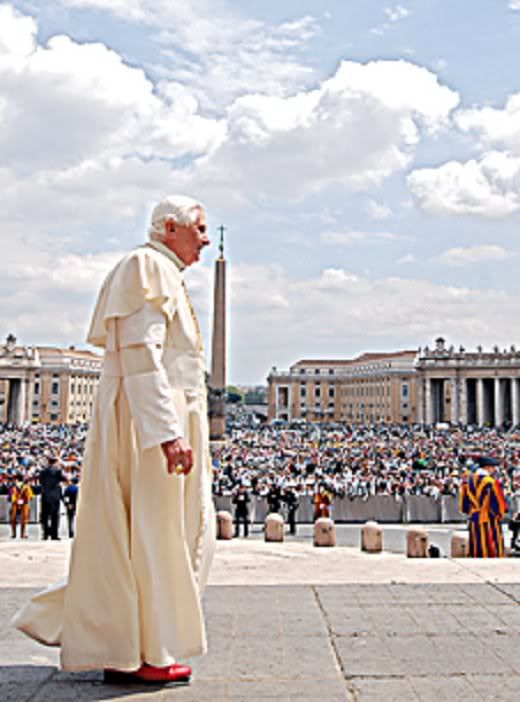 The General Audience today
The General Audience today - Full translation of the Holy Father's report on his recent US/UN trip,
and photos from Yahoo. But above photo is from Osservatore Romano.
The Pope meets Iranian Muslims - Vatican issues communique about it afterwards.
AFP files erroneous report about Pope's visit to Australia, giving the wrong dates 'July 12-21' -
the correct dates are July 17-21.
The Liturgies to be presided by the Holy Father in May-August 2008
======================================================================
    For some reason, this two-part interview by ZENIT with American theologian Michael Novak got tucked away in the Documents section of the site's index rather than in the news part. Hence, the delay in posting it - I did not know it was there until I checked through the Documents section for any translations of Papal texts I had not done and could pick up to post on the Forum.
Michael Novak on Pope's U.S. Visit
For some reason, this two-part interview by ZENIT with American theologian Michael Novak got tucked away in the Documents section of the site's index rather than in the news part. Hence, the delay in posting it - I did not know it was there until I checked through the Documents section for any translations of Papal texts I had not done and could pick up to post on the Forum.
Michael Novak on Pope's U.S. Visit
By Carrie Gress
WASHINGTON, D.C., APRIL 22-23, 2008 (Zenit.org).- The United States gave a warm welcome to Benedict XVI when he arrived to the nation, and it must have been a little bit of a surprise for the Pope, says Michael Novak.
Novak is a theologian, former ambassador to the U.N. Commission on Human Rights, and author of nearly 30 books, including the forthcoming "No One Sees God."
In part 1 of this interview with ZENIT, Novak discusses the Pope's reception in the United States, his comments on the sexual abuse crisis, and his address to Catholic educators.
What were your general impressions about the Pope's reception to the United States?
It must have surprised the Pope and his secretary and others what a tremendously warm welcome Washington and New York gave him.
You can know the Church in America abstractly, but when you compare it with other industrial nations, the people here are so religious that the churches are still full and the loyalty to the Holy See is very, very strong.
80% of Catholics in a Pew poll taken before Pope Benedict arrived said he was doing a good or a very good job. They approved him, they like him. I don't think it is like that in most of Europe.
I was at the arrival ceremony at the White House. The warmth of feeling for the Pope was tangible, and so was the good chemistry between the Pope and President George Bush. The warm feeling was very powerful. Both President and Pope looked very happy.
I thought the Pope probably had never met an evangelical Protestant from Texas before, and I think he was getting a big kick out of it--the brashness, straightforwardness, and directness. [He, of course, had already met the same brash Texan last June 9 at the Vatican!]
And then there is the manifest respect and love that President Bush has for the Pope. They are palpable.
President Bush has been grateful for the support of prayers from Catholics. He has done his best to soak up Catholic wisdom and Catholic ways of thinking about things. I don't think we are ever going to get a more Catholic president. Even the Washington Post said the other day that he is the "first Catholic president."
It seemed to me, though I don't see him everyday, that the Pope was overjoyed by the reception of the crowds. I wonder if Europeans expected this outpouring of love and affection from the people of America.
People around the world portray Americans to be more secular, more detached, more modern, and perhaps more decadent. To the European mind, 'Modern' means 'secular.' But in the American case, that's false. Here, modern means religious, not secular.
What did you think about the Pope's repeated mentioning of the abuse crisis that has plagued the Church in America?
The headline of the Washington Times on Monday, April 21, was "Pope visit soothes abuse crisis." Journalists are full of praise for the deft and serious way in which Benedict XVI expressed his shame, repentance and love regarding this issue.
At first, like many others, I was surprised that Benedict brought up the abuse crisis on the airplane. Then he brought it up in practically every venue thereafter.
The title of the Pope's pilgrimage was titled "Christ Our Hope," and he was calling us to renewal. For renewal to take effect, the right thing to do is begin with the confession of sin. I think it is true that we were all ashamed. I can't think of anything in my lifetime that shamed me more than the behavior of priests, almost always with young men.
The Holy Father, with the heart of a teacher, addressed Catholic college and university presidents. What did you think of his address to them?
A Catholic college president judged the Pope's talk to be a very good mixture of the encouragement, "You are doing a lot of good," and of quiet, indirect accusation: "Look, you have to take the faith seriously."
The Pope seemed to be saying: If you are a Catholic school, then your first task is to provide for all who live and study there an experience of the living God. You have to live up to what "Catholic" means.
The Pope has a quite wonderful teaching method. He speaks the harsh truth, and then turns you in a hopeful direction. Which really is the whole meaning of Christianity, to take evil and transform it into good.
The Pope used this method with the university presidents, saying roughly: "There are some bad things to call attention to, and we have to do better than that. Meanwhile, I want to encourage you and strengthen you because what you are doing -- in your more than 200 Catholic universities -- is unparalleled in the world, and you do so many things well. Be encouraged, be hopeful."
In Part 2 of the interview, Novak discusses the Pope's address at the United Nations and his relationship with youth.
What was your reaction to the Pope's address to the United Nations?
Part of his statement was standard, and repetitive of past statements, but part was very original and penetrating. The Pope emphasized that what is crucial for the United Nations and the world of the future is the protection of religious liberty.
Religious liberty is the most basic of all liberties because it protects the precious conscience of every person. He spoke of the need to protect religious minorities.
Implicitly, he defended the concept of equality before the law, and his comments relied on the establishment of the rule of law -- and probably also, of pluralistic democracies, of the sort that respect human rights.
But he did not stop at religious liberty. The United Nations, he said, must work to create room for religious people to speak of their faith and to argue from their faith in the public square. The public square does not belong only to secular people.
These passages brought to mind his exchange of letters with then president of the Italian Senate, Marcello Pera, in a volume called in English Without Roots: The West, Relativism, Christianity, Islam.
There, the Pope pointed out that in America the separation of church and state is not negative, but positive. For example, the state does not try to control the public square, but it allows room for religious people to fully express themselves in the religious sphere.
While church and state are separate in their functions, in actual life there can be no separation of religion and the political dimension of life. Each human person is at the same time a religious and a political being.
In those essays, he also distinguished the American idea of the separation of church and state from the European idea, which is very negative. What the Europeans do is give the state all the power and try to drive religion out, limiting it to the domain of private conscience.
It has been rare for Europeans to see the difference between Europe and America so clearly, and at least in this one respect, to command the American side of the argument. That was the spirit that seemed to animate many of his remarks in America.
At one point at the White House, the President quoted St. Augustine and Pope Benedict. And for his part, the Holy Father quoted George Washington. It was rather nice. I don't remember a Pope analyzing an American text in such a scholarly but easily understandable way. One hasn't often heard the Vatican make such distinctions.
John Paul II was very pro-American. He loved America. He didn't mind chastising us when he thought we were wrong, but he really appreciated "the phenomenology of America." He really appreciated the sense of the whole, as well as some of the details.
But Benedict has asked more carefully the question -- with the famous German capacity for analytic work -- "What is it that makes this country different? What is it that makes liberty work better here? What is it that creates a public square in which both religion and politics live fully together, and in which the faith of billions still thrives?"
In the White House, among journalists, and in many other places, Benedict XVI must have seen how many Catholics are present in important positions in the public square.
He must also have seen how vital certain Catholic ideas such as "the culture of life," "subsidiarity," "the common good," an awareness of "human weakness and sin," and opposition to abortion have become.
Twice at the Mass at Yankee Stadium in New York the crowd erupted in powerful applause during his sermon when the Pope spoke directly against abortion; pro-life sentiment is unusually powerful in America.
At the United Nations, one point Pope Benedict made is that it is not enough to mean by religious liberty the right of individuals to worship as they please, or to follow their conscience. Religious liberty also means a public space for religious activities.
In other places, the Pope praised all the public good that Catholics in America serve. There are some 220 Catholic universities, and those are public. He pointed to the huge Catholic hospital system, and the many Catholic missionaries working with the poor in Latin America and Africa. These are all public services. A good state has to allow scope for religious people to supply all these goods.
The youth were always so loyal to John Paul II -- even known as the "JPII Generation." How do you think they have received Benedict XVI? [The journalist has not heard of the GENERATION BENEDIKT 'born' in Cologne!]
Peggy Noonan wrote the other day in the Wall Street Journal that Pope John Paul was the perfect Pope for the television age, because he was so dramatic and had such a winning face, gestures, wit, he was so quick on his feet. He radiated affection the way a good actor should.
But, she said, Benedict is the best Pope for the Internet age. The blogs go on and on about what he meant by this, and what he meant by that. The discussion goes on for months. [Of course, any Benaddict's take on this is that Benedict's intellectual challenge for people does not mean he does not also have a personal attraction that is as warm and magnetic as John Paul's was. The two attractions are not mutually exclusive! Benedict himself has said that the legacy JPII left in his writing will take a long time to digest and assimilate!]
The argument about what Benedict XVI said and did at Regensburg, for example, is still not finished; it is still being plumbed and argued over.
I think the Holy Father has claimed the "JPII generation" as his own. It is now the JPII/Benedict generation. There is not a break between them.
Benedict used to meet every Friday for an hour or two of discussion with John Paul II. They were on the same track philosophically and theologically, and they basically strengthened one another. Looked at wryly, this is the 29th year of John Paul II's pontificate.
Benedict XVI is a different man with a different style, with a different set of priorities and a different manner of acting, but in him, all this is perfectly becoming.
Many commentators in America praised his sincerity and authenticity. He seems content to be who he is, and not to try to be someone else. One tough-guy journalist said to Peggy Noonan, as after a few days he nodded toward the Pope: "He's a good guy!"
Americans admire authenticity. Benedict XVI has a right to be different from John Paul while continuing in the same line of renewal and re-evangelization. I think we are enjoying the best of both worlds, two in one. [AMEN!]
[Modificato da TERESA BENEDETTA 02/05/2008 07:09] |
|
 30/04/2008 18:15 30/04/2008 18:15 |
|
| | | OFFLINE | | Post: 13.224 | Registrato il: 28/08/2005
| Utente Gold | |
|
    On April 28, this editorial in the Wahshington Times was written by John Magee, identified as the founder and pastor of Cornertone Church in San Antonio, Texas. I will 'google' him further later.
Thank you, Pope Benedict
On April 28, this editorial in the Wahshington Times was written by John Magee, identified as the founder and pastor of Cornertone Church in San Antonio, Texas. I will 'google' him further later.
Thank you, Pope Benedict
Editorial

April 28, 2008
During his recent visit to the United States, Pope Benedict XVI not only conducted Mass and met with the Catholic faithful, but he made a series of public statements about the role that our Judeo-Christian faith can play during these challenging times.
As an evangelical Protestant I happen to disagree with Pope Benedict on many issues of Christian doctrine and ritual. But when it comes to his moral vision for America and the world I have one thing to say in response to the Pope's visit: Amen.
I and many other evangelical leaders believe that our faith must not be confined to our churches on Sunday mornings. We maintain that our Christian values and compassion can be powerful tools for helping build a more just and humane nation.
Pope Benedict thus spoke for all of us when he said that "Any tendency to treat religion as a private matter must be resisted" and called for Christian participation "in the exchange of ideas in the public square."
The Pope was recalling the history we all cherish when he cited George Washington's Farewell Address to note that, "religion and morality represent 'indispensable supports' of political prosperity." The Pope likewise voiced all of our concerns when he recognized the threats posed by secularism and materialism not only to our morality but to our happiness.
As people of faith, our concerns go well beyond the borders of our country. After the horrors of the Nazi Holocaust, we joined our Jewish brothers in saying "Never Again!"
For me, this commitment means never again allowing the Jewish people to be massacred or persecuted and thus helps to motivate my strong support for the State of Israel.
But we also take from the Holocaust a universal "Never Again," which means that we must never again allow genocide to be perpetrated against any of God's children anywhere in the world.
Thus all of our hearts cheered when Pope Benedict stood before the United Nations and stated so forcefully that when states fail to protect the basic human rights of their citizens, "the international community must intervene."
Likewise, all people of faith applauded his comment in the same speech that it is religion's "recognition of the transcendent value of every man and woman" which provides the powerful source of our commitment to resist genocide and terrorism.
My reaction to Pope Benedict"s visit may surprise some who have come to accept certain caricatures of my views of the Catholic Church. But as I have noted from the start, my critics have ignored the real point and strong emphasis of my words.
I have indeed been quite zealous about condemning the past anti-Semitism of the Catholic Church. But I have been equally zealous in condemning Protestant anti-Semitism.
Furthermore, as I noted in my 2006 book Jerusalem Countdown, I have long viewed Pope John Paul II and now Pope Benedict XVI as partners in this "righteous work" of overcoming our shared legacy of Christian anti-Semitism.
For decades I have taught that we Christians need to recognize that our roots are Jewish. As Christians we can only understand ourselves if we understand the Judaism from which we sprang.
Pope Benedict made this very important point when he visited the Park East Synagogue in New York and shared that: "I find it moving to recall that Jesus, as a young boy, heard the words of Scripture and prayed in a place such as this." [Nor it the first time that Joseph Ratzinger/Benedict XVI has referred in such immediate terms to Judaism as the religion which Jesus, Mary and the Apostles grew in and practised.]
With visits and words such as these, Pope Benedict is continuing the important work of recognizing our enormous Christian debt of gratitude to the Jewish people.
The world in which we live faces many difficult challenges. In recent days, we read in our paper of increased starvation due to higher food prices; of alienated youth planning to bomb their fellow students; of Islamic militants actually bombing innocents in Iraq and Israel; and about people so devoid of hope that they end their own lives.
I believe that the message of the Bible and of Judeo-Christian faith offers us timely answers to these problems.
We were all inspired by Pope Benedict's visit. It is my prayer that we will now follow his example and look beyond our differences to see that when it comes to the great challenges of our times, people of faith have much in common.
=====================================================================
Carl Olson at Ignatius Insight i apparently quite familiar with Pastor Hagee's work, and takes him to task in this entry, which I will post in 8 pts, because the argument is not about Benedict at all.
 Tuesday, April 29, 2008
Tuesday, April 29, 2008
by Carl Olson
insightscoop.typepad.com/
Perhaps you've already seen this column in The Washington Times, written by John Hagee, pastor of Cornerstone Church in San Antonio and author of several "end times" books based in premillennial dispensationalism. Hagee has been accused of being anti-Catholic, but he takes pains to counter those accusations:
During his recent visit to the United States, Pope Benedict XVI not only conducted mass and met with the Catholic faithful, but he made a series of public statements about the role that our Judeo-Christian faith can play during these challenging times. As an evangelical Protestant I happen to disagree with Pope Benedict on many issues of Christian doctrine and ritual. But when it comes to his moral vision for America and the world I have one thing to say in response to the Pope's visit: Amen.
My reaction to Pope Benedict"s visit may surprise some who have come to accept certain caricatures of my views of the Catholic Church. But as I have noted from the start, my critics have ignored the real point and strong emphasis of my words. I have indeed been quite zealous about condemning the past anti-Semitism of the Catholic Church. But I have been equally zealous in condemning Protestant anti-Semitism. Furthermore, as I noted in my 2006 book "Jerusalem Countdown," I have long viewed Pope John Paul II and now Pope Benedict XVI as partners in this "righteous work" of overcoming our shared legacy of Christian anti-Semitism.
For decades I have taught that we Christians need to recognize that our roots are Jewish. As Christians we can only understand ourselves if we understand the Judaism from which we sprang. Pope Benedict made this very important point when he visited the Park East Synagogue in New York and shared that: "I find it moving to recall that Jesus, as a young boy, heard the words of Scripture and prayed in a place such as this." With visits and words such as these, Pope Benedict is continuing the important work of recognizing our enormous Christian debt of gratitude to the Jewish people.
Fair enough. I have no interest in questioning Hagee's sincerity, and his ecumenical attitude here is a pleasant surprise; after all, it's not something you'll likely find in the writings of, say, Tim LaHaye or Hal Lindsey. But a couple of things should be kept in mind:
• Hagee's beliefs, which flow from what might be called a "traditional" form of premillennial dispensationalism (as opposed to "progressive dispensationalism"), lead to the conclusion that the Jewish people have no need of the New Covenant because they already have a sufficient and equally valid covenant.
Which means, strangely enough, that Hagee has more in common with Abraham Foxman than he does with many or most Evangelicals when it comes to the issue of evangelization and Jews.
But Hagee's position is rooted in a rather logical take on John Nelson Darby's teachings, which were based on a heavenly-earthly dualism that insisted on a radical distinction between Christians (the heavenly people, according to Darby) and the Jews (who he called the earthly people of God).
• Hagee has stated that Jesus was not the Messiah. This is apparently one of the key positions he defends in his recent book, In Defense of Israel. I've not read that book, but I suspect that his argument is simply a continuation of the first point: namely, (according to Hagee) since Christians and Jews have radically different covenants with God, it is wrong to say that Jesus is the Messiah of the Jews — that is, until they accept Him as such after the Rapture, the Tribulation, and the Second Coming.
Other dispensationalists have adopted similar views. For example, Charles Ryrie, author of the very influential work, Dispensationalism Today (first ed., 1965), wrote this in his 1986 book, Basic Theology:
Gabriel announced to Mary that her Baby would have the throne of David and reign over the house of Jacob (Luke 1:32-33). Throughout his earthly ministry Jesus’ Davidic kingship was offered to Israel (Matt. 2:2; 27:11; John 12:13), but He was rejected. . . . Because the King was rejected, the messianic, Davidic kingdom was (from a human viewpoint) postponed. Though He never ceases to be King and, of course, is King today as always, Christ is never designated as King of the Church . . . Though Christ is a King today, He does not rule as King. This awaits His second coming. Then the Davidic kingdom will be realized (Matt. 25:31; Rev 19:15; 20) [Basic Theology, 259].
Ryrie's position is both confusing and untenable, but it is made necessary by the presuppositions of the dispensationalist system, at least in its older forms.
• Finally, the dispensationalist system is not only contrary to many key Catholic doctrines, it has often understood the Catholic Church as either being a system of anti-Christ, or at least being the sort of global institution/religion that will facilitate the rule of antiChrist and a false, "one world religion."
This perspective is not understood by those who hold it — as I once did — as being "anti-Catholic," but as simply being realistic about "Bible prophecy" and the world we live in. For Hagee and like-minded folks, salvation is about having a "personal relationship with Christ," which they believe has little or nothing to do with being a visible member of this or that church.
There is another, closely related radical dichotomy at work here, which is that between the spiritual and the material realms — itself based on the heavenly-earthly distinction noted above (I examine this at length and in detail in my book, Will Catholics Be "Left Behind"?).
For the typical dispensationalist (and most fundamentalists), the "Church" consists of all those who are spiritually united in saving faith in Jesus Christ (here's a good example of what I'm referring to). The church you attend is a secondary issue. And so there exists the notion that one can be perfectly saved and yet belong to an imperfect, local church.
Thus, from this perspective, a Catholic can be "saved," (by the skin of his teeth!) even if the Catholic Church is not just flawed, but even apostate and blasphemous.
Hagee is absolutely right to denounce anti-Semitism. But there are some serious problems with his theological ideas, especially how he understands the relationship between the Old and the New Covenants, the person of Jesus Christ, and the nature of the Church.
For me, frankly, the key issue is not if John Hagee is anti-Catholic. Rather, it's whether or not some of his core beliefs are actually Christian, even in the most general, "mere Christianity" sense of the word.
 |
 30/04/2008 23:36 30/04/2008 23:36 |
|
| | | OFFLINE | Post: 1.365 | Registrato il: 27/11/2005
| Utente Veteran | |
|
Papal liturgies etc. for May to August Details of Papal liturgies and journeys for May to August are now on the Holy See website.
The duration of Papa's apostolic trip to Sydney is July 12th to 21st, giving him several days to get over jet lag before the WYD actually starts on July 15th. |
 01/05/2008 18:04 01/05/2008 18:04 |
|
| | | OFFLINE | | Post: 13.237 | Registrato il: 28/08/2005
| Utente Gold | |
|
  Here is how Iran's official news agency reported the Pope's meeting yesterday with an Iranian Muslim delegation:
Iran's cultural official presents
Here is how Iran's official news agency reported the Pope's meeting yesterday with an Iranian Muslim delegation:
Iran's cultural official presents
copy of holy Quran to Pope

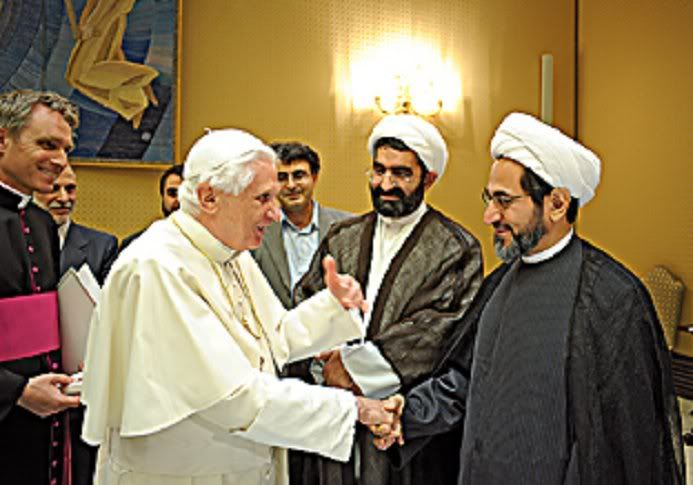
Vatican, May 1 (IRNA) - Pope Benedict XVI received visiting head of Iran's Islamic Culture and Relations Organization Mehdi Mostafavi on Thursday who presented a precious copy of Muslims holy book, the Quran, to the 81-year-old pontiff.
Mostafavi is currently in Italy heading a high-ranking delegation to attend an inter-faith dialogue with the Catholic Church in Vatican.
Appreciating Mostafavi for the valuable gift, the Pope said that the holy Quran was so dear to him.
He stressed that the contemporary world was in dire need of faith and wisdom as the two major factors that could help people face their challenges.
The Pope also expressed hope that bilateral relations and cooperation be further promoted between Iran and Vatican.
Mostafavi, for his part, voiced Tehran's readiness to promote bilateral cooperation with Vatican in the fields of cultural and religious activities.
=====================================================================
Besides the Vatican communique yesterday about the meeting with the Pope (report posted in preceding page of thie thread, , a joint statement was also issued by the Pontificakl Council for Inter-Religious Dialog and the visiting delegation, as follows:
 
The Pontifical Council for Inter-Religious Dialogue (Vatican) and the Centre for Inter-Religious Dialogue of the Islamic Culture and Relations Organisation (Tehran, Iran) held their sixth Colloquium in Rome from 28 - 30 April 2008 under the joint presidency of His Eminence Cardinal Jean-Louis TAURAN, President of the Pontifical Council for Interreligious Dialogue, and His Excellency Dr. Mahdi MOSTAFAVI, President of the Islamic Culture and Relations Organisation.
The delegation of the Pontifical Council for Interreligious Dialogue was composed as follows:
- His Excellency Archbishop Pier Luigi CELATA
- His Excellency Archbishop Ramzi GARMOU
- Reverend Monsignor Khaled AKASHEH
- Reverend Monsignor Prof. Piero CODA
- Reverend Father Prof. Michel FÉDOU, S.J.
- Prof. Vittorio POSSENTI
- Dr. Ilaria MORALI
The delegation of the Islamic Culture and Relations Organisation was composed as follows:
- Hojjat al-Islam Dr. Mohammad Jafar ELMI
- Hojjat al-Islam Dr. Mohammad MASJEDJAMEI
- Dr. Abdolrahim GAVAHI
- Hojjat al-Islam Dr. Seyyed Mahdi KHAMOUSHI
- Hojjat al-Islam Dr. Hamid PARSANIA
- Dr. Rasoul RASOULIPOUR
- Mr. Mohsen DANESHMAND
The participants, with the help of six papers presented by three scholars from each side, examined the theme Faith and Reason in Christianity and Islam, which was developed through three sub-themes from the point of view of Catholics and Shi’a Muslims: 1) Faith and reason: Which relation? 2) Theology/Kalam as inquiry into the rationality of faith; 3) Faith and reason confronted with the phenomenon of violence.
And the end of the meeting the participants agreed upon the following:
1. Faith and reason are both gifts of God to mankind.
2. Faith and reason do not contradict each other, but faith might in some cases be above reason, but never against it.
3. Faith and reason are intrinsically non-violent. Neither reason nor faith should be used for violence; unfortunately, both of them have been sometimes misused to perpetrate violence. In any case, these events cannot question either reason or faith.
4. Both sides agreed to further co-operate in order to promote genuine religiosity, in particular spirituality, to encourage respect for symbols considered to be sacred and to promote moral values.
5. Christians and Muslims should go beyond tolerance, accepting differences, while remaining aware of commonalities and thanking God for them. They are called to mutual respect, thereby condemning derision of religious beliefs.
6. Generalization should be avoided when speaking of religions. Differences of confessions within Christianity and Islam, diversity of historical contexts are important factors to be considered.
7. Religious traditions cannot be judged on the basis of a single verse or a passage present in their respective holy Books. A holistic vision as well as an adequate hermeneutical method is necessary for a fair understanding of them.
The participants expressed their satisfaction with the level of the presentations and the debates as well as the open and friendly atmosphere during the colloquium.
The participants were honoured and pleased to be received at the end of the colloquium by His Holiness Pope Benedict XVI, who was particularly satisfied with the choice of the theme and the venue of the meeting.
The next colloquium will be held in Tehran within two years, preceded by a preparatory meeting.
Vatican and Iran announce cultural collaboration
Rome, 30 April (AKI) - The sixth biannual meeting between representatives of the Vatican and Iran concluded on Wednesday with an agreement to boost cultural collaboration and strengthen dialogue between Islam and Christianity.
The Iranian delegation was led by Mehdi Mostafavi, an advisor to hardline Iranian president Mahmoud Ahmadinejad and the director of the Centre for Islamic Culture and Communication.
At the end of the three-day conference, Mostafavi met Gianfranco Ravasi, the president of the Pontifical Council for Culture - in effect, the Vatican's culture minister.
At the end of the meeting, Mostafavi told the Iranian news agency IRNA that the two sides had reached an agreement on a series of initiatives to strengthen dialogue between Islam and Christianity.
Among the suggestions listed by Mostafavi was the organisation of a meetings dedicated to theatre and cinema with religious content.
"Promoting common values through the appreciation of art could considerably contribute to the promotion of those values that are today ignored or underestimated in the West," said Mostafavi.
Ravasi and Mostafavi also discussed collaboration between scientific institutes linked to the Catholic church and the universities and Shia research centres in Iran.
Iran has about 300,000 Christians, less than one person of the population. However there are three Christian representatives in the Majlis - the Iranian parliament.
There are 362 churches in Iran and 60 schools run by the Christian community. Catholics and Orthodox Christians in Iran also manage 70 cultural centres and more than 100 newspapers including dailies, weeklies and monthlies.
[Modificato da TERESA BENEDETTA 02/05/2008 13:20] |
 01/05/2008 18:09 01/05/2008 18:09 |
|
| | | OFFLINE | | Post: 13.238 | Registrato il: 28/08/2005
| Utente Gold | |
|
 Beijing making concert effort
Beijing making concert effort
towards Vatican
The China Philharmonic Orchestra is to perform for the Pope, who has sought to improve ties with China to aid Catholics there.
By Don Lee

SHANGHAI, May 1 -- When the China Philharmonic Orchestra performs for Pope Benedict XVI at the Vatican next week, it will start with Mozart's religiously inspired Requiem and end with a popular Chinese folk song called "Jasmine Flower."
The concert Wednesday is a historic gesture that may help improve relations between the Vatican and Beijing, a major goal for this Pope as he seeks to expand freedoms for Roman Catholics in China.
The Beijing-based orchestra, along with the Shanghai Opera House Chorus, will perform for the Pope at Paul VI Audience Hall, the Vatican's principal auditorium. Although the orchestra played in Rome in 2004, this will be its first appearance at the Vatican.
"I certainly feel very excited," China Philharmonic's music director, Long Yu, said in a telephone interview from Beijing.
Vatican Radio, which first reported the concert, said, "Music is confirming its role as a language and most precious medium for dialogue among peoples and cultures."
Vatican sources said the initiative for the concert came from the Chinese.
In February, the New York Philharmonic gave an unprecedented performance in the North Korean capital of Pyongyang, though the reclusive nation's leader, Kim Jong Il, did not attend.
It wasn't clear how much next week's concert would help the Vatican and Beijing move toward reconciliation.
At the very least, the China Philharmonic's debut at the Vatican, part of a three-city European tour that begins Sunday, would carry significant symbolism for the millions of Catholics in China, who are split between official and underground churches.
Chinese Catholics are allowed to worship only at state-backed churches, and many worshiping at clandestine sites and professing loyalty to the Pope have been persecuted.
The Chinese orchestra is under the control of the officially atheist central government, which has had icy relations with the Vatican since the breakdown of diplomatic ties two years after the 1949 communist takeover in China.
Although Beijing has recognized the Pope as the Catholic Church's spiritual leader, it has repeatedly clashed with Rome over the authority to appoint priests and bishops in China, as well as the Vatican's diplomatic relations with Taiwan.
Since his election as Pope three years ago, Benedict has sought "constructive" dialogue with Beijing aimed at normalizing relations and has urged unity among all Catholics in China.
Yet he has also taken steps that undoubtedly rankled the Chinese government. The first batch of bishops that Benedict elevated to cardinal included the outspoken archbishop of Hong Kong, Joseph Zen.
The Pope invited Zen to pen the meditations for this year's Easter celebrations, where "living martyrs" were honored, and he has condemned the "suffering" of the people of Tibet.
At the same time, the Vatican and Beijing have quietly agreed on the appointment of some Chinese bishops.
"If it's true that the China Philharmonic is performing at the Vatican, it is a great example that the two sides are moving forward through an exchange of culture and arts," said Liu Bainian, vice chairman of the Chinese Catholic Patriotic Assn., which represents more than 6,000 official churches and 5.6 million Catholics.
Plans for the performance apparently came together fairly quickly.
"Like the pingpong diplomacy, it's very short notice," said Yu, 44, the orchestra's Shanghai-born and German-trained director. He was alluding to the cultural exchange of table tennis players between the U.S. and China in the 1970s that helped lead to restoration of relations between the two countries.
He said that what helped pave the way was a performance of the Requiem on April 8 at St. Ignatius Cathedral in Shanghai. More than 1,000 people, including some high-level Beijing officials, were said to have attended that event.
"That opened up this kind of territory," Yu said, adding that such a concert provides a common vehicle for promoting dialogue and peace.
And besides, the Pope is a big Mozart fan.
|
 01/05/2008 21:58 01/05/2008 21:58 |
|
| | | OFFLINE | | Post: 13.242 | Registrato il: 28/08/2005
| Utente Gold | |
|
    Pope wins friends
Pope wins friends
on first U.S. trip
By JOHN L. ALLEN JR.
Washington/New York/Rome

Published: May 2, 2008
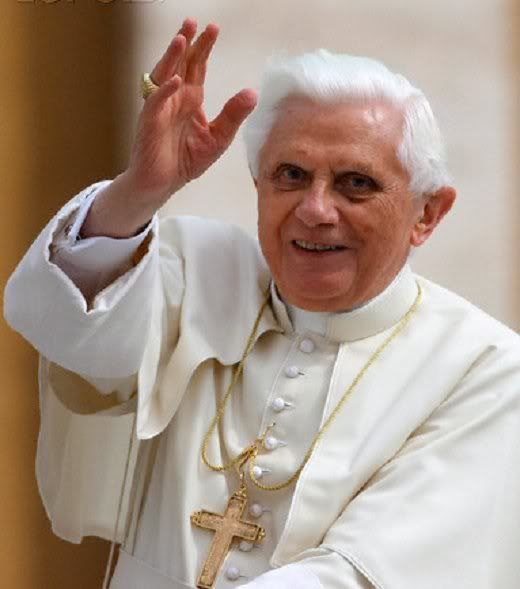
After specific memories of public events during Pope Benedict XVI’s April 15-20 visit to Washington and New York fade -- the huge public Masses in Nationals Park and Yankee Stadium, the elaborate reception on the White House lawn, the address to the General Assembly of the United Nations, the somber visit to Ground Zero -- it is just two words, kindness and candor, that capture impressions likely to linger in America’s collective consciousness.
The man deplaning at Andrews Air Force Base April 15 was something of an enigma for most Americans. A Pew Forum on Religion and Public Life survey on the eve of his arrival found that 80 percent of Americans, including two-thirds of the country’s almost 70 million Catholics, knew “just a little or nothing at all” about Benedict, despite his having been their Pope a full three years.
If nothing else, Benedict’s six-day trip afforded him a massive opportunity to introduce himself. The trip drew near-saturation coverage, with most events carried live on national networks and accompanied by extensive commentary in newspapers, on TV and in cyberspace. Though ratings are still being compiled, it’s safe to assume that tens of millions of Americans caught at least some of the Pope’s act.
By and large, what people saw was a figure who came off as gracious and surprisingly humble.
For example, the Pope celebrated Mass inside St. Patrick’s Cathedral April 19, the first time a Pope had done so. This event, occurring within the walls of America’s most storied Catholic church, had the effect of cutting the papacy down to size, creating a more intimate feel for the roughly 3,000 priests and religious gathered there. The Mass took place inside St. Patrick’s because, as Benedict himself explained it, a proper liturgical space puts the focus where it belongs -- on God rather than the person of the Pope.
On at least two occasions, Benedict set aside the persona of a global celebrity to become a simple, caring pastor. Those were his unprecedented April 17 meeting with five victims of sexual abuse, and his April 20 visit to Ground Zero, where he met 24 first responders, survivors, and family members of victims of the 9/11 terrorist attacks. Benedict reached out in other ways, such as his moving visit to Manhattan’s Park East Synagogue on April 18, the eve of Passover.
At the level of content, Benedict offered a welter of messages over the six days, including some of his classic themes. He expressed appreciation for the vital public role of religion in the United States. He strongly endorsed multilateralism in foreign affairs and human rights. And he insisted on the necessary bonds between reason and faith, truth and freedom.
Pope speaks of hope, joy
More than Benedict’s words, it was his tone that left the deepest impression. During 16 occasions when he made public remarks, totaling almost 30,000 words, the word “hope” appears 101 times, the word “joy” 34.
Meanwhile, two words commonly associated with images of this Pope in his former role as Cardinal Joseph Ratzinger, the doctrinal enforcer -- “error” and “discipline” -- are conspicuous by their absence.
One striking note of the visit is that at least three times pro-choice Catholic politicians received Communion during a papal Mass, although not directly from the Pope. House Speaker Nancy Pelosi and Sen. John Kerry, both Democrats, took Communion at the April 17 Mass at Nationals Park in Washington, while former New York Mayor Rudolph Giuliani did so at the April 19 Mass at St. Patrick’s Cathedral.
It’s not that Benedict shrank from laying down challenges. His opposition both to abortion and to Catholics who support abortion rights were made unmistakably clear. But he apparently preferred to leave his visit unmarred by the spectacle of people turned away from the sacrament.
In his address to America’s bishops April 16, he lamented “the scandal given by Catholics who promote an alleged right to abortion” and insisted that the Gospel be preached “integrally” against what he has termed a “dictatorship of relativism”; in an April 17 session with Catholic educators, the Pope demanded consistency about “the essential moral categories of right and wrong”; in perhaps his toughest speech of the trip, he told a group of other Christian leaders April 18 that an ecumenism not based on “the purity of normative doctrine” would be a sham.
The Pope’s inattention to gay and lesbian Catholics was disappointing to some. Francis DeBernardo, executive director of New Ways Ministry, an organization that works for justice and equality for lesbian and gay Catholics within the church, said he thought the Pope, in his strong defense of heterosexual marriage in his talk to bishops, and by linking human rights and natural law in his talk at the United Nations, had indirectly targeted homosexuals, and missed an opportunity to make a welcoming gesture to lesbian and gay Catholics.
In most settings, though, the Pope won points for graciousness and breadth of vision. In that speech to educators, for example, the Pope did not lay down any new rules or regulations, and he acknowledged that a school’s Catholic identity cannot be reduced to such crude measures as statistics or the “orthodoxy of course content.” Contrary to some speculation before the fact, the speech came off as anything but a scold.
On the whole, Benedict seemed determined to strike a positive tone -- a kinder, gentler image of the papacy and, by extension, of the Church.
“Sometimes we are looked upon as people who speak only of prohibitions,” he told a massive youth rally in New York. “Nothing could be further from the truth. Authentic Christian discipleship is marked by a sense of wonder. We stand before the God we know and love as a friend, the vastness of his creation, and the beauty of the Christian faith.”
No ducking the question
As for candor, in some ways the $64,000 question coming into the trip was whether the Pope would openly engage the sexual-abuse crisis that has rocked the American Catholic Church -- and not just since 2002, when it burst into full public view in Boston, but since at least the early 1980s when the National Catholic Reporter and other media outlets first began to report the story.
Early signals did not seem promising; Benedict declined to visit Boston, the epicenter of the recent crisis, and had no session with victims on his public itinerary.
From the opening moments of the trip, however, it was clear that Benedict had no intention of ducking the question.
“We are deeply ashamed, and we will do all that is possible that this cannot happen in the future,” the Pope said in a session with reporters aboard the papal plane April 15 in response to a question from NCR.
Benedict argued that efforts to address the crisis have to unfold on three levels: the legal and juridical, the pastoral, and programs of prevention to ensure that future priests are “sound.” Pointedly, the Pope said, “It’s more important to have good priests than to have many.”
In his address to American bishops at the National Shrine of the Immaculate Conception on Wednesday evening, April 16, he returned to the theme. The Pope devoted five full paragraphs to sexual abuse of children, referring to it as “evil” and a “sin.”
In perhaps his most dramatic phrase, quoting Cardinal Francis George, president of the U.S. bishops, the Pope conceded that the crisis was “sometimes very badly handled.” He pledged the Church to pursue healing and reconciliation with those “so seriously wronged.”
Again during his Mass Thursday morning at Washington’s Nationals Park, Benedict offered strong language about the crisis.
“I acknowledge the pain which the church in America has experienced as a result of the sexual abuse of minors,” he said. “No words of mine could describe the pain and harm inflicted by such abuse.” He went on to urge all American Catholics to “do what you can to foster healing and reconciliation, and to assist those who have been hurt.”
On Thursday afternoon came the most dramatic papal gesture, and the biggest news flash, of the entire trip -- an unannounced and unprecedented meeting with five victims of sexual abuse. Most were from the Boston area, and they were accompanied by Cardinal Sean O’Malley of Boston. The meeting took place in the Vatican embassy in Washington and lasted roughly a half-hour.
‘It was spiritual abuse’
Three of the five victims spoke to NCR and other media about the experience. All three appeared to feel a corner had been turned.
“I basically told him that I was an altar boy in the sacristy, a young boy praying to God, at the time that I was abused, and it wasn’t just sexual abuse. It was spiritual abuse,” said Bernie McDaid, who was 11 years old when molested for the first time by Fr. Joseph Birmingham at St. James Parish in Salem, Mass. “I told [the Pope] that he has a cancer growing in his ministry, and needs to do something about it,” McDaid said.
“I think there are already changes happening. And there’s definitely so much hope right now,” said Faith Johnston, whose priest abuser was convicted of raping her when she was 15 and working Saturdays in a Catholic rectory. She said in a televised interview after the meeting that she had been unable to speak about her abuse in the presence of the Pope, and was able to offer him only her tears.
All told, Benedict made five public references to the crisis during his six days in the United States, in addition to this April 17 meeting with victims.
Without any doubt, legitimate questions surround the high-profile fashion in which the Pope addressed the scandals. For one, some critics wonder where this candor has been for the last quarter-century, a span of time in which Church officials certainly were aware of the “cancer” to which McDaid referred. For another, it’s still not clear whether any new policy or structural changes will result from Benedict’s blunt speech.
One indication of the sticky matters ahead came in a front-page story in The New York Times April 19, quoting Cardinal William Levada, an American and head of the Vatican’s Congregation for the Doctrine of the Faith, to the effect that the statute of limitations in canon law for bringing charges of abuse might be lifted. (Canon law states that an abuse victim has to make the charge within 10 years of his or her 18th birthday.)
The story seemed odd, since insiders were aware that this statute of limitations had already been set aside as part of special American norms for sex-abuse cases approved by the Vatican. A Vatican spokesperson promptly issued a denial, saying that Levada had been misunderstood. If nothing else, the episode illustrates that questions about “what comes now” are sure to abound.
In an April 17 interview with CNN, David Clohessy of the Survivors Network of those Abused by Priests, known as SNAP, said that the Pope’s rhetoric would ring hollow until it was backed by action. Specifically, Clohessy called for Benedict to extend the “zero tolerance” policy of the American bishops to the universal Church, and for at least a couple of American bishops associated with the crisis to be fired.
Some critics point out that Boston’s former archbishop, Cardinal Bernard Law -- conspicuous by his absence as the only American cardinal who did not accompany the Pope on his trip -- remains in Rome as archpriest of the Basilica of St. Mary Major. To some, Law’s new assignment, distancing him from accusers, symbolizes the Church’s failure to hold senior leadership accountable for the crisis.
[Forgive me for being dogged about this, but I believe it's only fair that when Cardinal Law's case is brought up, whoever is writing the story should point out that it was John Paul the Great who decided what to do about him after he resigned as Archbishop of Boston. Who are we to gainsay that decision? What do we know what private agreements the Pope and Law could have talked about for Law to make what amends he can in private towards the victims or in some indirect way? And perhapsAllen should have included a line in this story abou the explanation he gave in another story that the Church does not consider bishops 'officials' in the common sense, but rather as 'fathers' to their flock? We may disagree with that 'escape clause', but if that is the way it is, then we ought to know clearly.]
Nevertheless, even skeptics were inclined to give the Pope high marks for understanding the crisis is still an open chapter. SNAP, for example, called the meeting with victims “a long-overdue step forward on a very long road,” while also cautioning Catholics to “stay vigilant.”
More broadly, it will take time to assess whether Benedict XVI’s triumphant American swing has any measurable impact on the church in the United States.
Russell Shaw, a noted Catholic writer, cautioned that we’ve seen all this before, seven times under Pope John Paul II -- huge, adoring American crowds, massive media coverage, and talk of corners turned.
“Looking back 20 or 25 years later in terms of anything you can quantify in American Catholicism,” Shaw said soberly, speaking to The Associated Press, “it’s all been downhill.”
That said, Popes do inevitably set a tone for the Catholic church at all levels, for good or for ill.
If the basic tone struck by Benedict over time pushes both the leadership and the grass roots of the American church in the direction of greater kindness and candor, then perhaps Catholics will come to regard the time and expense of the trip as an investment in a different future, one well worth the cost.
And the NCR editorial in the same issue:
Pope's American visit: What now?
Editorial
By NCR Staff

May 2, 2008
In the wake of Pope Benedict XVI’s visit, as his image, words and gestures fade from the media, it is time to ask: What now? As we digest the texts of his speeches and homilies, will there be any
accompanying shift in attitude or policy in the American Church? Already disappointment is being voiced by some who wanted an explicit rejection of the Iraq war or full and immediate accountability for the sex-abuse scandal, and by others eager for more papal clout applied to politicians who support abortion rights, or to strengthening Catholic identity or assuring doctrinal clarity.
In one sense, the Pope’s general remarks on a wide range of topics transcended partisan needs, offering instead bedrock Catholic principles such as protection of human rights and dignity. These he applied to each area he addressed, calling for a balance of freedom and truth for academia, family preservation in immigration policy, multilateralism and the common good in international affairs, and unity amid great diversity within the church.
But in another sense, because the Pope came as the exemplar of the Church’s commitment to human dignity, some of his gestures and words were a direct challenge to the American Church.
His repeated mention of the sexual-abuse scandal and his personal meeting with a small group representing some 13,000 known victims were prominent among these challenges. It revealed what was closest to the pope’s heart, and it set a new benchmark for the American hierarchy, whose response to the crisis, in the Pope’s own words, has often been “badly handled.”
How did this Pope, who dismissed the crisis in 2002 as an American problem, and as statistically insignificant, come to this crucial emphasis for his first American visit?
[As this accusation is always thrown back, it might help to point out that Cardinal Ratzinger made the comment at the time the abuses were just hitting the headlines in the United States, and he was asked about it at a news conference during a visit to Spain for a Christological conference. If I recall, he answered that to his knowledge, the offenses involved a tiny minority of the American clergy (true) and that it appeared the media were generating much of the issue by their coverage of it (also true, but under the circumstances, it was widely interpreted as a 'dismissal' of the charges and/or 'denial' that is was an issue at all).]
Some say it was his struggle as head of the Congregation for the Doctrine of the Faith to get at the truth in the high-profile case of the founder of the Legionaries of Christ, the late Fr. Marcial Maciel Degollado, accused of abusing his own seminarians.
A personal friend of Pope John Paul II, who essentially ignored the abuse crisis for the better part of 20 years, Maciel denied the accusations, but in 2005 was censured and removed from active ministry under Pope Benedict XVI.
Some say it was the 2004 visit to then-Cardinal Ratzinger by Judge Anne Burke and other members of the National Review Board appointed by the American bishops after their 2002 Dallas meeting. Burke reportedly made the call out of concern that U.S. bishops were not conveying the depth of the scandal to the Vatican.
What clearly has had a deep effect on Pope Benedict was what he once referred to as “our Friday penance,” time he spent every Friday morning reading from the thousands of abuse files sent to him as head of the doctrinal congregation. The files and the record of the official handling of cases disturbed Ratzinger deeply. (Anyone wishing to replicate the Pope’s “Friday penance” is forewarned that the files and court records available at www.bishop-accountability.org are shocking.)
His determination to get the Church through and past this scandal reflects both his intellectual consistency and apparent willingness to let this issue be the keynote of his visit. How otherwise could he dare speak to those outside the Church about human dignity?
In the end, Benedict chose from among the many personas his long career has assigned to him -- professor, enforcer, Supreme Pontiff -- to come to America as a humble pastor who sought out those who were suffering, not to preach to them, but to listen, to let their tears touch him. It made his visit successful in ways that can be measured only by what happens now.
Will other bishops likewise act as pastors? In his meeting with victims, the Pope offered a credible sign of compassion and accountability that can move this protracted and destructive scandal beyond outrage and intransigence toward truth and reconciliation. The Pope has shown his brother bishops the next step toward healing.
=====================================================================
First, I thank the NCR staff for the editorial, despite the point I took issue with.
But, of course, it is not the first to point out that the Holy Father came through during this visit as a pastor - though with varying degrees of surprise that he was pastoral at all, and very effective doing so.
But isn't that the first role of the Successor of Peter? Universal Pastor? "Feed my flock", Jesus told Peter. Certainly no one alive can be more acutely and constantly aware of this pastoral role as the man who is on Peter's Chair.
All his discourses, homilies, messages and extemporaneous remarks as Pope have been overwhelmingly, principally pastoral, in that he conveys his Magisterium - whether it is dogma, theology, philosophy, liturgy - in a pastoral manner such that even the simplest of us can grasp what he is telling us. And from what he has told us about the life of St. Augustine, he has been following the saint's own example in this respect.
That he came across so effectively as a pastor during this trip is perhaps the true 'revelation' to many pundits and media observers, and even many within the Church itself - people who never really paid attention to what he has been doing and saying as Pope, or who were always effectively blocked by their prejudices from seeing him as he really is.
The greatest achievement of this trip in terms of media is not so much the unexpected saturation coverage that it got, but the fact that such wall-to-wall coverage in print and broadcast made it impossible for anyone in media to paint the Pope with the tired and false stereotypes they had built up over years about him, because clearly, those had nothing to do at all with the flesh-and-blood Joseph Ratzinger/Benedict XVI who, for six days, was under 24/7 scrutiny by the eyes of America. Resulting in what George Weigel called 'the end of the caricature'.
Of course, he remains 'conservative', as every Pope by definition should be. But now he is seen as a conservative who has a genuinely pastoral and paternal heart that complements his formidable intellect. A Pope no less worthy of affection and esteem as his great and saintly predecessor.
[Modificato da TERESA BENEDETTA 02/05/2008 00:22] |
 01/05/2008 23:06 01/05/2008 23:06 |
|
| | | OFFLINE | | Post: 13.243 | Registrato il: 28/08/2005
| Utente Gold | |
|
  Japanese bishops appeal to Pope
Japanese bishops appeal to Pope
in clash with Neocatechumenals
By Gerard O'Connell
Special Correspondent in Rome
ROME, April 30(UCAN) -- In an extraordinary move, the Japanese Bishops' Conference sent a delegation last week to discuss with Pope Benedict XVI "the serious problem" they are having with the Neocatechumenal Way and its seminary in Takamatsu diocese.
The four prelates went to the Vatican to seek the Pope's understanding and intervention to help resolve the situation.
It was the third time Japanese bishops visited and brought up the matter in five months.
"We hate to come so often but we had to given the serious nature of the problem that needs to be resolved", Archbishop Okada of Tokyo, president of the bishops' conference, told UCA News in Rome.
During their ad limina visits in December, they raised their concerns not only with the Pope but also with officials at the Congregation for the Evangelization of Peoples. Indian Cardinal Ivan Dias heads the congregation.
A delegation of Japanese bishops returned in early April 2008 and discussed the matter a second time with congregation officials, who they sensed were somewhat supportive of the Neocatechumenal movement, Archbishop Okada recalled.
They then decided to speak again with Pope Benedict. Archbishop Okada, when he addressed the Pope on behalf of the bishops on Dec. 15, had said:
"Another matter would be The Neocatechumenal Way (the Way) and the International Takamatsu Diocesan Seminary known as Redemptoris Mater. We have here a serious problem. In the small Catholic Church of Japan, the powerful sect-like activity of Way members is divisive and confrontational. It has caused sharp painful division and strife within the Church. We are struggling with all our strength to overcome the problem but feel that if a solution is to be found, the consideration of Your Holiness for the Church in Japan will be of the utmost importance and direly needed."
The Neocatechumenal Way, founded in Spain in 1964, today claims around 20,000 communities with 1 million members in 105 countries.
The Takamatsu seminary is one of the movement's 73 missionary seminaries worldwide, all called Redemptoris Mater and each under a diocesan bishop. The six in Asia are in Hong Kong, India, Japan, Pakistan, the Philippines and Taiwan.
Bishop Francis Xavier Osamu Mizobe of Takamatsu has confirmed he also spoke about the problem in his diocese during his private ad limina audience with Pope Benedict.
The Pope, however, made no reference to the matter when he addressed the Japanese bishops as a group on Dec. 15, at the end of their visit.
Four months later, on April 25, he talked about it in depth with Archbishop Okada, Archbishop Leo Jun Ikenaga of Osaka, Archbishop Joseph Mitsuaki Takami of Nagasaki and Bishop Mizobe.
The small diocese of Takamatsu, based 520 kilometers southwest of Tokyo, has about 5,000 Catholics.
Bishop Mizobe's predecessor agreed to host the seminary there. But as serious problems emerged and tensions mounted, Bishop Mizobe, a Salesian, decided to close it. The bishops' conference supported him, its president confirmed.
Keen to maintain a base in Japan, the Neocatechumenal movement sought to gain another bishop's backing. At first one agreed to host the seminary, but after discussing the matter with brother bishops he decided against this and informed the evangelization congregation and the movement accordingly.
On April 25, Archbishop Ikenaga, vice president of the bishops' conference, submitted a detailed brief on the situation to the Pope.
According to Archbishop Okada, the bishops talked with Pope Benedict for almost an hour. "He listened to us very attentively. He is trying to understand us. He is very serious," the prelate told UCA News.
"The diocesan seminary is to be ended. The Holy See has agreed that it be closed as a diocesan seminary this year," he said.
The bishops, he explained, continue to have "serious and deep" problems with the movement that relate to its "way of thinking" and its "attitude" to Japanese culture, liturgy and other issues.
Asked whether the Vatican understands this, Archbishop Okada said he feels "there is still a gap between us," but the situation "is improving." He added that the way Pope Benedict listened greatly encouraged him.
Archbishop Okada revealed they also discussed with the Pope the scheduled Nov. 24 beatification in Nagasaki of the 188 Japanese Martyrs.
=====================================================================
A few months ago, the Catholic priests in the Holy Land made the same complaints about the NeoCatechumenals working in their area. Quite apart from their insistence on Eucharistic liturgy that is not in consonance with Catholic practice, it appears the NeoCatechumenals
are equally over-aggressive in their 'missionary outreach'.
Surely there must be a reason that the Vatican has held up approving the movement's statutes. Some time in 2005, Pope Benedict warned them against continuing with liturgical practices that do not meet Church criteria. My impression is that the Neoatechumenals are very much acting like a sect within the Church - a sect that will not conform with the Body of the Church, however. Are they not being as 'schismatic' as the Lefebvrians and other radical traditionalists, if not more so - because where the dyed-in-the-wool traditionalists carry on the pre-Conciliar liturgy, the neo-Catechumenals appear to be designing their own liturgy?
I don't think that the church movements encouraged by Vatican-II were meant to design their own liturgy! Imagine if each of them did that! And we do not read of the Comunione e Liberazione, or the Focolari, or the Sant'Egidio Community, for instance, doing that, nor arousing antipathy and hostility from the regular clergy!
Recently, some in the Italian media noted how the Neo-Catechumenal founder, Kiko Arguelles, received Communion from the Pope at the Ordination Mass last Sunday on the tongue, but with his arms crossed and held against his body, rather than with hands clasped. Was that an act of defiance?
Arguelles may be well-meaning, and his NeoCatechumenal Way may have done great things for its followers, etc. - I have no way of knowing - but my impression of him in the past three years is that he seems to be someone who seeks to have himself pictured with the Pope at every chance he gets, as though such 'proof' of proximity would sanction anything that his movement does. One tends to mistrust such pushiness.
[Modificato da TERESA BENEDETTA 01/05/2008 23:07] |
 01/05/2008 23:59 01/05/2008 23:59 |
|
| | | OFFLINE | | Post: 13.244 | Registrato il: 28/08/2005
| Utente Gold | |
|
   

Editorial, May 2008

Speaking to the US bishops on April 16, Pope Benedict XVI made the arresting comment that an “almost complete eclipse of an eschatological sense” marks “many of our traditionally Christian societies.”
America, he didn’t need to add, is one of them, but the very warmth of the welcome the Holy Father received in the US and the intensity of attention during his visit suggested a growing exhaustion with the eclipse of religion under secularism and a hunger for God’s revelation of man’s ultimate purpose.
Burdened by the yoke of an ideology that treats God as irrelevant to the ordering of society — an ideology which has at once destabilized public life, eroded the foundations of culture, and corrupted US Catholicism — Americans were ready for the Holy Father’s theme of “Christ Our Hope,” open to his arguments about the harmony of reason and revelation, and moved by his humility and piety.
Media pundits, stunned by this reaction, speculated on the papacy’s enduring significance. They offered various superficial reasons for it without arriving at the real one: it remains Christ’s way of staying present throughout history.
Into the darkness of godless voids — whether comforting the victims of priestly abuse near the beginning of the trip or kneeling in prayer at the pit of Ground Zero near the end of it — Christ’s vicar brought forth his light.
In a false age, Pope Benedict offers truth; to the weary and enslaved, he represents grace. As the eye naturally turns to light, so people of good will turn toward holiness.
Often dismissed as a mere academic, the Holy Father showed characteristic honesty and courage in confronting pastorally the concrete effects of the crises he addressed intellectually.
He delivered a talk one day to the bishops on the importance of fidelity to the doctrines and discipline of the Church, then the next day comforted those victims who suffered at the hands of a dissenting and lax clerical culture.
He gave a speech to the General Assembly of the United Nations on the dangers of amoral power ideology, then two days later visited the “Ground Zero” site of its most extreme manifestation.
Some reporters regarded his treatment of the relationship between faith and reason — the theme of the Catholic “vision of reality” to which he repeatedly returned — as nothing more than feckless theological abstraction.
But what they failed to see was that the crises he came to address, both the one inside the Church and the one outside of it, resulted from ideological novelties they indulge, relativistic theories that shattered the relationship between faith and reason and drove Jesus Christ and his Church to the margins of society.
The profound and the pastoral are intrinsically linked, and the Pope’s call for a renewal of an “intellectual culture” that rests on a sound and comprehensive account of nature, man, and God, an account in which revelation reinforces and purifies reason while building upon it, is central to “charity.”
As the grim chapters of history illustrate, false philosophy and theology have real, not abstract, consequences; errors about man’s ultimate destiny, while they may at first seem like harmless differences of “opinion,” show up immediately and destructively in politics and culture.
Deliberating on the good of man without consulting the God who determined it — in other words, the mode of public life that has held sway for decades — produces not human utopias but civilizational chaos, spiritual torpor and poisonous conceits: a concept of “freedom” that enslaves, “rights” that devour each other, and a rhetoric of “human dignity” that degrades.
Reporters and commentators, of course, focused little on the import of the Holy Father’s speeches, directing most of their attention to his reaction to the abuse scandal, even as they showed no interest in the skeptical, secularized Catholicism that advanced it.
Doubts about the seriousness of sin — doubts stimulated by uncertainty about the existence of God and the natural moral law —created the deepest conditions for it.
Hence, the Pope’s speech to Catholic educators, in which he exhorted them to recover the Catholic intellectual tradition in its integrity, was not separate from his call for a “holier” episcopate and priesthood in light of the scandal, but was very much connected to it.
As Pope Benedict departed from America, he left many riches behind: he leaves American Catholics with sermons and speeches to ponder and an example of holiness to follow; he leaves American bishops with a calm exercise of authority to emulate; to the American public he leaves an invitation to consider Christ as the answer to hopelessness, and to their leaders he leaves an opportunity for wiser public discourse.
Let us hope that his historic visit marks a turning point in the life of the Church in America — a moment for American Catholics to undertake a “new Pentecost,” as he put it, and transform the scandals of recent years into an occasion for “purification.”
George Neumayr is editor of Catholic World Report.
|
 02/05/2008 04:05 02/05/2008 04:05 |
|
| | | OFFLINE | | Post: 13.246 | Registrato il: 28/08/2005
| Utente Gold | |
|
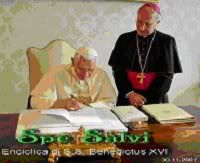 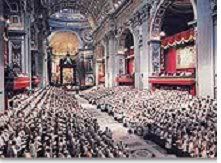 Spe Salvi and Vatican II
Spe Salvi and Vatican II
In Spe Salvi the Pope has given the world a profound encyclical
that may well stand as a signpost
when the history of the post-conciliar Church is written.
by Brian A. Graebe

March 2008
What an excellent commentary this is on Spe salvi! It confronts head-on Joseph Ratzinger/Benedict XVI's problems with Gaudium et Spes, a subject previously touched on by such writers as Cardinal Avery Dulles and Fr. Schall, but much more explicitly exposed here, and in the clear context of Benedict's view of Vatican-II as a continuity with the tradition of the Church, even as he offers modern man a refreshingly new vision of Christian hope that has nothing to do with utopian optimism.
Spe Salvi, Pope Benedict XVI’s eloquent encyclical on Christian hope, provides a reflection on man’s place in the modern world that alternately comforts, cautions and encourages.
Animating the entire work is what might be termed an eschatological immanence: Christians have a future beyond this world, and that “distinguishing mark” shapes and permeates the present. Hope in the future, then, becomes not mere wishful thinking, but a lived reality.
Pope Benedict uses a favorite line when he writes that “the Christian message was not only ‘informative’ but ‘performative’” (2). Faith, the substance of hope, allows us confidently to live in the “already-not yet,” partaking here and now in the divine life whose fullness has been promised to us.
That “great hope”— a constant refrain — alone makes life worth living. Rising above the demands and expectations of this world, the hope-filled Christian radiates an interior freedom.
In a particularly moving passage, Benedict extols the life of St. Josephine Bakhita as one who, in the face of slavery’s enormous cruelty, ascended the heights of hope and lived as a free child of God.
And yet when God is denied, or ignored, hope’s future promise becomes disfigured.
“Perhaps many people reject the faith today simply because they do not find the prospect of eternal life attractive….To continue living for ever — endlessly — appears more like a curse than a gift” (10).
Benedict answers this concern with a stirring vision of the extra-temporality of heaven as “plunging into the ocean of infinite love…plunging ever anew into the vastness of being, in which we are simply overwhelmed with joy” (12). Such a hope allows the Christian to have abundant joy in this life, aware of that which awaits him in the next.
Even in the most harrowing of trials, the Christian never lives alone. Quoting the Vietnamese martyr Paul Le-Bao-Tinh, Benedict recalls the transformative power of suffering: “In the midst of these torments, which usually terrify others, I am, by the grace of God, full of joy and gladness, because I am not alone — Christ is with me…” (37).
In the words of Bernard of Clairvaux, “Impassibilis est Deus, sed non incompassibilis” — God cannot suffer, but he can suffer with. This is true com-passion, a co-suffering. Although an assent to love always produces suffering in the diminishment of self, God shares our burdens and offers consolation.
In this divine communion, “the capacity to suffer for the sake of the truth is the measure of humanity” (39). Those who paid the ultimate price for truth, the martyrs, stand as necessary witnesses to the greatest love and the embodiment of the greatest hope.
Ultimately, the martyrs offer witness that justice is not to be found in this world.
In a paramount theme of Spe Salvi, Benedict writes that, “In the modern era, the idea of the Last Judgment had faded into the background: Christian faith has been individualized and primarily oriented towards the salvation of the believer’s own soul, while reflection on world history is largely dominated by the idea of progress” (42).
For Benedict, the Last Judgment forms the essential context of all hope. Whatever the injustices of this world, God will set all things right.
Here, Spe Salvi furthers the early reflections on heaven with a clear and unqualified examination of purgatory and hell. After a remarkably ecumenical look at the Eastern Church’s theology of purgatory, Benedict describes hell as the place for those who “have totally destroyed their desire for truth and readiness to love…who have lived for hatred and have suppressed all love within themselves. This is a terrifying thought” (45).
The Pope’s candor is at once surprising and refreshing; in putting forth the Church’s teaching he minces no words, yet writes with a deep trust in the goodness of God’s justice and love.
In the end, the burden is on each man to live a good life — our actions determine who we are, and resonate eternally. If we are willing to take up the cross and follow Christ, then the moment of judgment will be welcomed rather than dreaded.
“We welcome and we absorb the overwhelming power of his love over all evil in the world and in ourselves. The pain of love becomes our salvation and our joy….The judgment of God is hope, both because it is justice and because it is grace” (47).
Our full communion with the Body of Christ finds its beginnings here and now, as hope instructs and informs us on that journey. And it is Mary, Star of the Sea, who will always “shine upon us and guide us on our way” (50).
For all of Spe Salvi’s theological depth, however, it is what the encyclical does not say that has engendered no small amount of controversy. As numerous commentators quickly recognized, Spe Salvi contains not a single reference to any of the documents from the Second Vatican Council.
Moreover, for one of the four major constitutions of the council, the very title of which contains the word hope ( Gaudium et Spes), to be entirely absent from an encyclical devoted to hope begs consideration.
Indeed, the omission is glaring: since the close of Vatican II, the four encyclicals of Pope Paul VI and all fourteen encyclicals of Pope John Paul II cite the conciliar documents in abundance. A brief look at the statistical compilation underscores the uniqueness of this omission.
Pope Paul’s four post-conciliar encyclicals cite Vatican II an average of seventeen times; Gaudium et Spes specifically an average of seven times.
Those numbers skyrocket in John Paul’s oeuvre: Vatican II documents are referenced an average of forty times in his encyclicals; in Redemptoris Mater alone, there are no fewer than one hundred and three footnotes citing council documents.
Gaudium et Spes appears an average of twelve times in each of John Paul’s encyclicals; Veritatis Splendor sets the high-water mark with thirty-five references. With the exception of Paul’s first post-conciliar encyclical, the brief Christi Matri, and John Paul’s fourth encyclical, Slavorum Apostoli, Gaudium et Spes.has appeared in every single papal encyclical for the past forty-two years.
It even makes an appearance in Benedict’s first encyclical, Deus Caritas Est (along with two other conciliar citations). And yet in Spe Salvi, nary a mention. From a peritus of the council, the failure to refer at all to the most theologically significant event in the past century — not to mention in the life of Joseph Ratzinger — is nothing short of startling. But what does it all mean?
Reactions to Spe Salvi’s conciliar silence have ranged from dismissive to alarmed. The Italian press especially has read quite dramatically a seismic shift in Benedict’s ecclesiology: only two days after the release of Spe Salvi, Rome’s La Repubblica, the largest-circulating newspaper in Italy, carried the sensational headline, “The pope who renounces the modern world.”
Writing with an enormous oversimplification of both the council and the thought of Pope Benedict, the article concludes that “Benedict XVI has turned his back on the Vatican Council.”
Another journal proclaimed, “Benedict XVI: A pope who ignores the Second Vatican Council.” The commentator Antonio Socci, offering a balanced analysis, goes so far as to dub Spe Salvi “a bomb.”
Are these conclusions much ado about nothing? Only through an exploration of Ratzinger’s view of Vatican II, and specifically Gaudium et Spes, can we fully and properly understand the genesis of Spe Salvi and how Pope Benedict intends for it to be read.
Even before the conclusion of the council, Ratzinger saw ominous signs on the horizon. What specifically troubled him was the final document, the Pastoral Constitution on the Church in the Modern World ( Gaudium et Spes).
Suspicious of its heavily Chardinian influences, Ratzinger believed that the document spoke of the Church’s encounter with the modern world in overly optimistic tones. Lacking a balanced discussion of sin and the divide between the Church and the world (cf. John 15:18), Gaudium et Spes offered a focus on progress that he would later term (specifically in reference to article 17) “downright Pelagian.”
While Ratzinger contends that the document could, and should, be read properly, and that certain articles are quite laudable (e.g., 22), he nonetheless looks warily upon an unfounded rapprochement between Christian man and modernism.
Ratzinger’s suspicions would deepen and solidify in the post-conciliar years. Specifically, he was greatly disappointed to see Gaudium et Spes, which he regarded as the least of the four major constitutions, come to be viewed as the crowning work of the entire council. For Ratzinger, it was just the opposite.
Magisterial pronouncements should be deeply rooted in the ancient creeds, not in a superficial dialogue with non-believers.
While Gaudium et Spes presented, in Ratzinger’s view, a curious project with which to close the council, it was never meant to define the entire spirit of the council itself. These suspicions saw rather immediate realizations: a “can-do” spirit soon enveloped the Church, an optimism that had little grounding in the historical reality of the Pilgrim People of God.
Such a progressive outlook found its way into the pews, as tradition was largely cast off, to be replaced with self-affirming exhortations to “build the city of God.”
If the world is really not so bad after all, many began to ask, why do we need Christ? A renewed focus on the present, no longer grounded ecclesiologically or historically, served drastically to undermine the Church and her authority.
The flood-gates had been opened by a misplaced emphasis, and, as Ratzinger foresaw, people soon began wondering where things had gone so terribly awry. In short, the misreading of Gaudium et Spes resulted in a divorce between the council’s twin goals of aggiornamento and ressourcement; without the latter, the former becomes woefully inept and even detrimental.
To counter this prevailing tide, Joseph Ratzinger would devote much of his intellectual output over the next few decades to a “re-grounding” of the authentic aims of the council’s renewal.
The greatest error in the Church, one committed by both traditionalists and liberals alike, was to view the council as a fundamental break with the Church’s past.
For traditionalists, this was unimaginable treachery, and resulted most infamously in the Lefebvre schism of 1988. For liberals, the council un-tethered the Church and allowed for untold numbers and types of innovation, experimentation and reinterpretation. Ratzinger saw all of this as terribly wrong.
Throughout his writings, interviews and memoirs, Joseph Ratzinger clearly sees the legacy of Vatican II as having been hijacked, and needing to be restored to its proper place in the heritage of the Church. This means neither turning the clock backwards, nor jumping ahead, but re-evaluating the present situation of the Church.
The council must be authentically interpreted and implemented, not as a break from the past, but as a legitimate development of the Church’s magisterium.
The key to this goal, for the Pope, undoubtedly lies first and foremost in liturgical restoration. (For a fuller treatment of this topic, one would do well to refer to Eamon Duffy’s fine lecture, “Benedict XVI and the Eucharist,” published in the March 2007 New Blackfriars.)
In this vein, Ratzinger balks at the subtle but too-pervasive mindset that the Catholic Church began in 1965. The council must be viewed in the wider context of the Church’s history and living Tradition. That history comprises twenty-one ecumenical councils, of which Vatican II is but the most recent.
The lack of references to that particular council in Spe Salvi seems to possess a dual significance. Benedict is firstly, in Robert Moynihan’s fine phrase, “re-weighting” the council, placing it in the fullness of Church teaching.
Interestingly, although Benedict cites the Catechism of the Catholic Church eight times, not one of the paragraphs cited contains in itself a footnote to Vatican II. Benedict is making a strong statement, affirming the council implicitly and only through the authoritative lens of the entire magisterium.
At the same time, the Pope seems to be signaling (as Socci and others point out) that the Church has moved past the Vatican II era, one that has been unfortunately marked by deep-seated division and misunderstanding.
Ratzinger sees it as irrefutable that the great expectations of the council, and its promises of renewal, have been frustrated. Taking a candid look at the fruits of the past forty years, Benedict finds them largely rotten. The sunny optimism with which many read Gaudium et Spes, looked at from today’s vantage point, rings hollow.
Entering the third year of his papacy, then, Benedict evidences a clear “back-to-basics” approach. Foregoing overtures to the secular world, Pope Benedict, like his namesake, appears intent on shoring up the faith among its adherents.
His ecumenical overtures — to the Orthodox, to the Anglicans, to the Lefebvrists — all bear the urgent stamp of this need for unity. It is noteworthy that, unlike John Paul’s encyclicals, which were addressed “to all men and women of good will,” Benedict directs his to “all the lay faithful.”
The difference is subtle but underscores a clear shift in focus and priority. Benedict has spoken often of a smaller Church in the future, one composed, as it were, of a remnant faithful. Such language contrasts sharply with John Paul’s “new springtime”; Benedict may well foresee a new springtime, but only after a deep winter.
Much of this divergence finds its nexus in the term “Kingdom of God.” When Gaudium et Spes was misread in a secular and progressive way, talk of the Kingdom envisioned a world where universal peace and harmony reigned. If only we could eliminate war, poverty and injustice, heaven would become a place on earth. Without discounting the noble aspirations of these goals, Benedict nevertheless views them with a skeptical eye.
Looking at the modern world, the Pope sees a widening gulf between the secular project and the Church. In place of mutual cooperation and shared values, a spirit of marked hostility characterizes modern man’s view of Christianity.
Nowhere was this more recently crystallized than in the bitter debate over the European constitution. A mere mention of Europe’s Christian patrimony met with furious opposition by the architects of their new continental order.
Benedict stands unafraid, then, in calling the enemies of the Church by their name. Spe Salvi offers a penetrating look at the evils of Communism, both in theory and in practice.
Moreover, Benedict speaks frankly of the Antichrist, albeit through the writings of Kant, as a real threat to the faith of Christians in the end times.
Benedict here picks up an ancient theme of the Church —the continual struggle and ultimate incompatibility between the Church and the world. This conflict was given voice in 1976 by then-Cardinal Karol Wojtyla: “We are today before the final struggle between the Church and the Anti-Church, between the Gospel and the Anti-Gospel.”
One can find this theme throughout Benedict’s writings, often through the work of Vladimir Soloviev, Russian philosopher, poet and religious thinker.
In one of Soloviev’s books, The Open Way to World Peace and Welfare, the Antichrist ushers in an age of pure rationalism and earthly well-being. In his short work, The Antichrist, Soloviev portrays the title character as a scripture scholar whose exegetical work denies the divinity of the Christ of the Gospels. Reducing Jesus to a mere social worker and non-violent resister, the Antichrist destroys the faith of Christians.
Joseph Ratzinger explored these themes at length in an address at St. Peter’s Lutheran Church during his 1988 visit to New York; he employed them again in his recent book Jesus of Nazareth.
Both Marx and Soloviev’s character fall into the same trap: trying to establish the Kingdom of God without God. It has been the project of man ever since the fall — in Eden, in Babel, in the modern world. And all such projects, uninformed by man’s ultimate destiny, are doomed to fail.
“There is no doubt, therefore, that a ‘ Kingdom of God’ accomplished without God — a kingdom therefore of man alone — inevitably ends up as the ‘perverse end’ of all things…” (23).
No earthly paradise, if such a thing were possible, would ever satisfy man, whose restless heart yearns for the infinite, for the great beyond.
Spe Salvi thus stands as a powerful corrective to this misguided optimism. Its lengthy middle section, dealing with the way in which hope can — indeed, must — inform the present, offers a true and sobering vision of the Kingdom of God.
Suffering and death do not disappear, but they are never the same. Hope, rooted in love, has transformative ability. Once man is freed by love, truly free for his own excellence, this love spreads outward and becomes manifestly present in the communion of saints here on earth. This foretaste, this longing, foreshadows the authentic Kingdom of God.
Such an assessment of the world is far from optimism. Indeed, when The Ratzinger Report appeared in 1985, it was widely deemed a pessimistic book.
But Pope Benedict has little use for such caricatures, which only represent subjective evaluations or wishful thinking. Instead, he revisits Christian hope as a little-remembered and less-understood virtue, but one that has the power here and now to shape the world for the better.
“Certainly we cannot ‘build’ the Kingdom of God by our own efforts….The Kingdom of God is a gift, and precisely because of this, it is great and beautiful, and constitutes the response to our hope” (35).
And so, Pope Benedict’s remarkable encyclical deserves to be read carefully. It shares an undeniable and, at times, uncomfortable link to the Second Vatican Council.
But rather than rejecting or minimizing the council, Pope Benedict restores its teachings to a rightful place and perspective within the Church.
Seeking to free the truth of the council’s documents, most notably Gaudium et Spes, from decades of misinterpretation and wrong emphases, Pope Benedict hopes that the fruits of the council can slowly and surely begin to blossom.
One can see in this young pontificate a steady mission, unashamedly reinforcing and renewing areas of the Church — theological, ecumenical, liturgical — that he believes have stagnated for too long.
In many ways, he continues the work of his great predecessor, although with a directness that can be seen variously as refreshing, startling or jarring.
One has every reason to believe that this pope has much more he wishes to accomplish; for now, he has given the world a profound encyclical that may well stand as a signpost when the history of the post-conciliar Church is written.
For as cautiously as Benedict reads the signs of the times, this demure Bavarian smiles and forges ahead with a sure grounding in hope —the very hope by which alone we are saved.
Brian A. Graebe is a seminarian of the Archdiocese of New York, studying at St. Joseph’s Seminary, Dunwoodie. After completing undergraduate studies at New York University in 2002 (philosophy, summa cum laude), he did graduate work in classics at the American Academy in Rome. Last summer he was chosen to participate in the Tertio Millennio Seminar on the Free Society in Kracow, Poland, where he studied Catholic social doctrine through the lens of Pope John Paul II’s encyclical Centesimus Annus. This is his third article for HPR.
[Modificato da TERESA BENEDETTA 02/05/2008 23:22] |
 02/05/2008 12:51 02/05/2008 12:51 |
|
| | | OFFLINE | | Post: 13.248 | Registrato il: 28/08/2005
| Utente Gold | |
|
  
     Pope to holiday at secret location
Pope to holiday at secret location
in Australia before WYD
So the AFP did get it right the other day! Very unprecedented - but how are they going to keep the Pope's arrival secret anywhere?
SYDNEY, May 2 (AFP) - Pope Benedict XVI will holiday at a secret location in Australia before World Youth Day in Sydney in July, event organisers said Friday.
Sydney Archbishop George Pell said the Pope would arrive in Australia on July 13 and leave on July 21, taking three days vacation before attending World Youth Day.
Event organisers said the 81-year-old pontiff "has decided to spend several days preparing for his encounter with young people" following the lengthy flight to Australia from Rome.
"The trip to Australia will be the longest journey the Holy Father has ever undertaken," World Youth Day coordinator Anthony Fisher said, adding organisers had selected a holiday destination for the Pope that was "beautiful and suitable for the leader of the world's Catholics."
"He will have the opportunity to see some of Australia's beautiful flora and fauna," Fisher said.
"We cannot, of course, disclose the location; he is a head of state seeking private time and has asked that that privacy be respected."
The Pope will be officially welcomed to Sydney in a harbourside ceremony on July 17.
Organisers have said they expect World Youth Day to attract some 125,000 international visitors to Australia's largest city.
The trip has sparked complaints over the costs involved after it was revealed that taxpayers would contribute 86 million Australian dollars (80.4 million US dollars) towards the event.
New South Wales state Premier Morris Iemma defended spending taxpayers' money, saying it would showcase Sydney to a global audience while generating 150 million dollars in revenue.
Catholics make up about a quarter of Australia's population of some 21 million people.
The first World Youth Day was held in Rome in 1986 and is now held in an international host city every two to three years. The last was in Cologne, Germany, in 2005.
Pope to rest at 'secret Sydney site'
before World Youth Day
 of Sydney
May 02, 2008
THE Pope will holiday at a secret location in or around Sydney as part of his visit to Australia for World Youth Day, it has been revealed.
The three days will be spent resting from his longest flight as p\Pontiff.
Archbishop of Sydney, Cardinal George Pell, today announced Pope Benedict XVI will arrive in Sydney on Sunday, July 13, ahead of the official start of WYD activities on July 15.
The 81-year-old Pope will spend three days without engagements, recovering from the long flight from Italy and preparing for his gruelling WYD schedule.
"This will be the longest journey Pope Benedict has undertaken," Cardinal Pell said.
"He will rest up for three days ... in an undisclosed location."
WYD organiser Bishop Anthony Fisher said the Catholic Church was delighted the Pope was coming early.
He declined to reveal where he would be staying, but said it would be in a location which would show Australia in its best light.
"We want to make sure we find a place for him that is serene and beautiful, gives him a real Aussie experience and gives him privacy during that time," Bishop Fisher said.
The Catholic Church will underwrite the cost of the Pope's extended stay, which he is taking from his annual leave.
Pope Benedict will be officially welcomed to Sydney in a harbourside ceremony on July 17 and will take part in WYD events until July 20.
[Modificato da TERESA BENEDETTA 02/05/2008 13:08] |
 02/05/2008 23:15 02/05/2008 23:15 |
|
| | | OFFLINE | | Post: 13.263 | Registrato il: 28/08/2005
| Utente Gold | |
|
THE POPE'S DAY, 5/2/08
The Holy Father met today with:
- Cuban bishops on ad-limina visit, Group 2. Later, he addressed
all the Cuban bishops together in Spanish.
- Archbishop Leon Kalenga Badikebele, Apostolic Nuncio to Ghana, accompanied by members of his family.
- Bishop Frans Daneels O. Praem., secretary of the Supreme Tribunal of the Apostolic Signatura, accompanied by members of his family.
- Bishop Juan Ignacio Arrieta Ochoa de Chinchetru, secretary of the Pontifical Council for Legislative Texts, accompanied by members of his family.
- Cardinal Giovanni Battista Re, Prefect of the Congregation for Bishops (weekly meeting).
CUBAN CHURCH CALLED ON
TO OFFER THE ONLY TRUE HOPE:
CHRIST
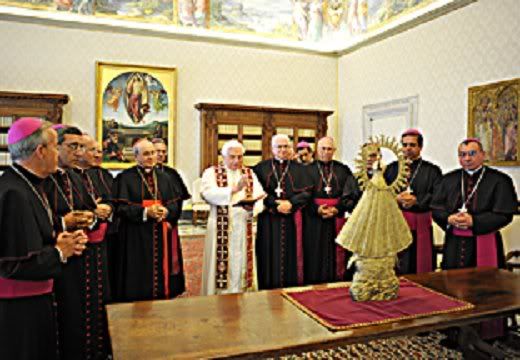
VATICAN CITY, 2 MAY 2008 (VIS) - This morning in the Vatican, Benedict XVI received prelates from the Conference of Catholic Bishops of Cuba, who have recently completed their quinquennial "ad limina" visit.
The Holy Father began his address to the bishops by underlining "the vitality of the Church in Cuba, as well as its unity and its commitment to Jesus Christ".
He also remarked upon the "profound change" in ecclesial life in Cuba "especially since the celebration of the Cuban National Ecclesial Meeting, now more than 20 years ago, and above all following the historic visit to Cuba in 1998 by my venerated predecessor Pope John Paul II".
"At this historic moment, the Church in Cuba is called to offer all Cuban society the only true hope: Our Lord Jesus. ... This means that the fomentation of ecclesial life must be given a central role in your aspirations and your pastoral projects".
After thanking priests for "their faithfulness and tireless service to the Church and the faithful", the Holy Father expressed the hope that "an increase in vocations and the simultaneous adoption of appropriate measures in this field, may soon enable the Cuban Church to have a sufficient number of priests, as well as the churches and places of worship necessary to accomplish her strictly pastoral and spiritual mission".
"It is necessary", he went on, "to continue promoting a specific form of vocational pastoral care, one that is not afraid of encouraging the young to follow the footsteps of Christ, Who alone is capable of satisfying their longing for love and happiness". At the same time he encouraged the prelates to ensure seminarians have "the best possible spiritual, intellectual and human formation" so that, "identifying themselves with the Heart of Christ", they can shoulder "the commitment to the priestly ministry".
Benedict XVI highlighted "the exemplary efforts of so many male and female religious", whom he encouraged to continue "enriching the whole of ecclesial life with the wealth of their charisms and their generous commitment". He also thanked "the numerous missionaries who offer the gift of their consecration to all the Church in Cuba".
He then turned to focus on "one of the main objectives of the pastoral plan", the promotion of "a committed laity", and he invited the prelates to encourage "an authentic process of education in the faith at various levels, with the help of well-trained catechists". He also asked them to facilitate "reading and prayerful meditation upon the Word of God", for the faithful, "as well as their frequent attendance at the Sacraments of Penance and the Eucharist".
The Pope also stressed how, with an "intense spiritual life and the support of a solid religious education", the laity "will be able to offer convincing testimony of their faith in all areas of society, illuminating them with the light of the Gospel. In this context, it is my hope that the Church in Cuba, in keeping with her legitimate aspirations, may enjoy normal access to the social communications media".
On the subject of the pastoral care of marriage and the family, the Holy Father encouraged the prelates "to redouble their efforts so as to ensure that everyone, and especially the young, gains a better understanding of - and feels ever more attracted by - the beauty of the true values of marriage and the family. At the same time, it is necessary to encourage and offer the appropriate means so that families can exercise their responsibilities, and their fundamental right to a religious and moral education for their children".
The Pope spoke of his joy at realising "the generosity with which the Church in your beloved nation is committed to serving the poorest and the most disadvantaged, for which she receives the appreciation and recognition of all the Cuban people. I give you my heartfelt encouragement to continue bringing a visible sign of God's love to those in need, the sick, the elderly and the imprisoned".
Benedict XVI concluded by expressing the hope that the forthcoming beatification of Servant of God Fr. Jose Olallo Valdes "may give fresh impulse to your service to the Church and the people of Cuba, always being a leavening for reconciliation, justice and peace".
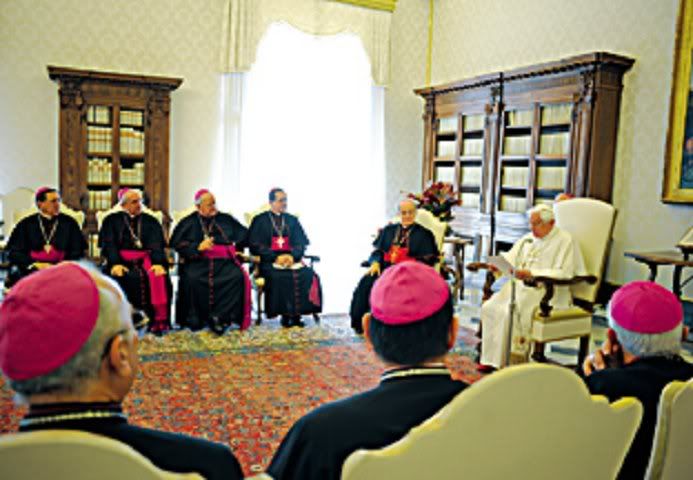
[Modificato da TERESA BENEDETTA 03/05/2008 00:02] |
 03/05/2008 03:07 03/05/2008 03:07 |
|
| | | OFFLINE | | Post: 13.264 | Registrato il: 28/08/2005
| Utente Gold | |
|
    Benedict and the Human Face of God
Benedict and the Human Face of God
By Richard John Neuhaus
 
May 2, 2008
We will be, or at least we should be, pondering the visit of Pope Benedict for a long time to come. I do not agree with the widely expressed view that this will be his only pastoral visit to America.
To judge by the vitality exhibited, which seemed to grow with his every day here, this may be a pontificate as long as that of Leo XIII, who died at age ninety-three. Benedict just turned eighty-one. He may return in five years or so to see how we have responded to his proposal this time around.
As some of us have been repeating incessantly, the important thing is to listen carefully to what he is saying. And then to download all the addresses and read them carefully, and then read them again.
During his visit, he laid out an astonishingly comprehensive program for the renewal of the Church and the Church’s witness to the world. Consider, too, that his arguments — and he is always making arguments — must be understood within the context of more than four decades of scholarship intimately tied to devotional and pastoral reflection.
For those who really want to understand the mind of Benedict, we have no better study than Aidan Nichols’ The Theology of Joseph Ratzinger. Admittedly, that book is twenty years old, and we have to hope that Father Nichols has a sequel in the works.
Meanwhile, we are greatly assisted by Tracey Rowland’s Ratzinger’s Faith, just out from Oxford. Rowland is an Australian and is part of the international Communio circle. She is, in my view, too taken with the mainly Anglican “Radical Orthodoxy” project with its campaign against sundry manifestations of “liberalism,” including a caricature of “neoconservatism.” But in this book that is only a minor distraction.
Ratzinger’s Faith is a lucid introduction that places his thought within a variety of schools that have emerged since the Second Vatican Council and addresses his understanding of revelation, Scripture, and tradition.
It also clarifies his commitment to, along with his criticism of, modernity, with its devotion to freedom and reason, and dispels misunderstandings of his view of the Church’s social and political witness—misunderstandings largely stemming from his familiar critique of liberation theologies.
Not least of the merits of Rowland’s study is its succinct treatment of Ratzinger on liturgy and devotional practices, highlighting his debt to Hans Urs von Balthasar, a subject on which I touched in last Friday’s posting, “Benedict and Beauty.”
Recall that the theme Benedict chose for his American visit was “Christ Our Hope.” The radically Christocentric character of Christian faith is the theme that holds together what might be called, if the phrase had not been used and abused in other connections, the seamless garment of his thought.
“Christ Our Hope,” of course, picks up on his second encyclical or teaching letter, Spe Salvi — we are saved in hope. That, in turn, extends the reflection of his first encyclical, Deus Caritas Est — God is love.
Already in the message preliminary to his visit, Benedict refers to Christ as “the human face of God.” This is a recurring phrase in his writings, pointing to the foundation of what is aptly described as his Christian humanism. Well into the pontificate of John Paul II, Avery Cardinal Dulles concluded that the best phrase to describe the message of that great Pope is “prophetic humanism.”
The question of who influenced whom and precisely how during the decades of intimate collaboration between Ratzinger and John Paul the Great will likely never be resolved definitely. It is beyond dispute that the influences were mutual and intense, and “prophetic humanism” fits Benedict as well as it fits John Paul the Great.
Of particular importance in this connection is their understanding of the council’s document on the Church in the modern world, Gaudium et Spes — Joy and Hope. John Paul had a considerable measure of proprietorial pride in that document, having been closely involved in its drafting.
When questioned about whether it was not excessively optimistic about historical progress, he would answer, with just a touch of defensiveness, that, if that was the case, it was at least “an evangelical optimism.”
There is of course no question of either Pope questioning the Spirit-guided authority of conciliar documents, but the wholehearted acceptance of a document’s authority does not necessarily entail an agreement that it addressed adequately the subject at hand.
Ratzinger has over the years been quite candid in saying that the first part of Gaudium et Spes offers such a roseate view of human progress that one is left wondering why the redemptive work of Christ is really necessary.
Both John Paul and Benedict repeatedly invoke section 22 of the constitution, where it is said that Jesus Christ is not only the revelation of God to man but also the revelation of man to himself.
This Christological insight is the hermeneutical key, if you will, to understanding the prophetic humanism of both John Paul and Benedict. The “human face of God” is both the revelation of God and the revelation of man in the image of God.
Benedict is relentless in his critique of every form of nominalism, voluntarism, and a naked command-theory of morality. This has everything to do with his “controversial” comments on Islam at Regensburg University in September 2006.
It was said that this was a sharp departure from the more irenic approach of John Paul II, but the questions put to Islam by the latter in his best-selling book, Crossing the Threshold of Hope, are every bit as incisive as what was said at Regensburg.
The Christian understanding of God is not that of an omnipotent deity handing down commands from on high, but that of God’s emptying himself of glory (kenosis) in order to become one with his human creatures, inviting and enabling us to be lifted up by participation in his eternal life. In other words, incarnation; in other words, “the human face of God.”
This theme is nicely caught in Ratzinger’s remarks, a few months before he was elected Pope, at the funeral of Luigi Giussani, the founder of Community and Liberation. “Christianity is not an intellectual system, a collection of dogmas, or a moral system. Christianity is an encounter, a love story, an event.”
Of course nobody is more assiduous in defending the intellectual and doctrinal tradition of the Church, including moral doctrine, but the point is that all of that only coheres in the encounter with the human face of God, Jesus Christ.
This encounter is not simply a private spiritual experience of “knowing Jesus Christ as my Lord and Savior.” The Christ encountered is the logos — the word and reason that is both the source and reason of all that is.
It is an intensely personal encounter but never just a private encounter. The revelation of God in Christ is emphatically public. As he said at the Washington meeting with leaders of other religions, “Christianity proposes Jesus of Nazareth.”
And at the United Nations, he underscored that the Christian cannot divest himself of faith in this great truth — or stifle his witness to this great truth — in order to gain admission to the public square.
All religions and worldviews are, whether they explicitly recognize Christ or not, informed to a greater or lesser degree by the logos that makes possible, through the exercise of the gift of reason, a measure of common understanding pertinent to the right ordering of our life together.
During those seven days in our country, Benedict set forth to different audiences a comprehensive vision of hope for the Church and the world. In a forthcoming issue of First Things, I intend to offer a more detailed analysis of the several addresses and how they inform and reinforce one another, resulting in a proposal of “Christ Our Hope” that is aptly described as prophetic humanism.
[Modificato da TERESA BENEDETTA 03/05/2008 03:08] |
 03/05/2008 20:07 03/05/2008 20:07 |
|
| | | OFFLINE | Post: 1.368 | Registrato il: 27/11/2005
| Utente Veteran | |
|
Rosary at Saint Mary Major Papa visited the basilica of Santa Maria Maggiore today at 5 pm BST [ 6 pm CEST] for a recitation of the Joyful Mysteries of the Rosary. It was totally beautiful! Papa led the decades, reciting the Pater Noster and first part of the Ave Maria and a young person read an introduction to each mystery.
At the end the choir sang the Salve Regina in the best known setting, then the Litany of Our Lady, followed by the Regina Caeli - all in Latin.
Papa gave a short address, but I was so anxious about recording it all that I didn't take it in at the time. I'm sure it will be posted soon.
On his way out of the basilica he met Joaquin Navarro Valls - looking very well, I thought. He also met the new prime minister of Italy.
The basilca is the home of the icon of Our Lady Salus Populi Romani.
|
 03/05/2008 22:41 03/05/2008 22:41 |
|
| | | OFFLINE | | Post: 13.282 | Registrato il: 28/08/2005
| Utente Gold | |
|
THE POPE'S DAY, 5/3/08
The Holy Father met today with:
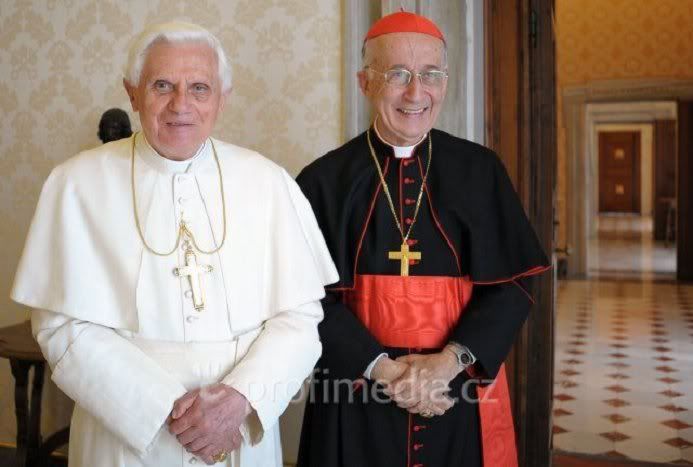
- Cardinal Camillo Ruini, Vicar-General of His Holiness for the Diocese of Rome
- Three more Cuban bishops on ad-limina visit (Group 3).
- Participants in the Plenary Session of the Pontifical Academy of Social Sciences. Address in English.
Full text has been posted in HOMILIES, DISCOURSES, MESSAGES.
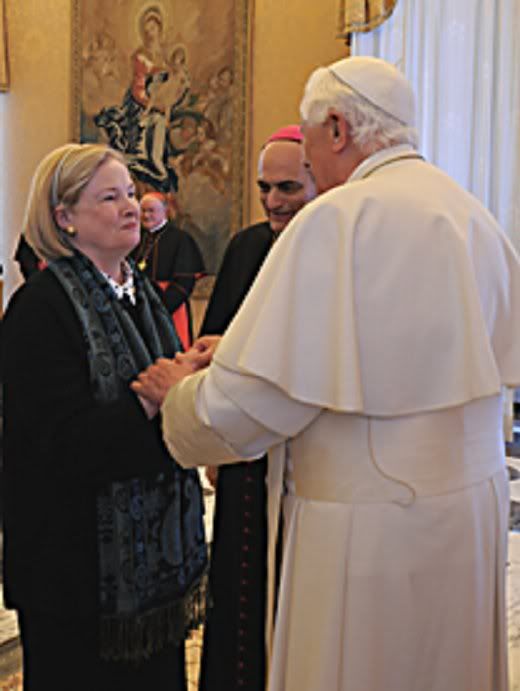 The Pope greets Ambassador Mary Ann Glendon, who was president of the Pontifical Academy
The Pope greets Ambassador Mary Ann Glendon, who was president of the Pontifical Academy
of Social Sciences until she was named US ambassador to the Holy See.
In the afternoon, the Holy Father led the recitation of the Rosary at the Basilica of Santa Maria Maggiore.
A full translation of his remarks after the prayer has been posted in HOMILIES, DISCOURSES, MESSAGES.
Tomorrow, Sunday, May 4, Cardinal Angelo Bagnasco will celebrate Mass at St. Peter's Basilica at 10:30 a.m. to mark Catholic Action Day in Italy.
The Holy Father will come to the Basilica at the end of the Mass to greet the congregation. Afterwards, he will lead the Regina Caeli from the front steps of St. Peter's.
To Pontifical Academy of Social Sciences:
BUILDING THE COMMON GOOD,
WORKING FOR PEACE AND JUSTICE
VATICAN CITY, 3 MAY 2008 (VIS) - Today in the Vatican, the Holy Father received participants in the plenary assembly of the Pontifical Academy of Social Sciences, who are meeting to study the theme: "Pursuing the common good: how solidarity and subsidiarity can work together".
Addressing them in English, the Holy Father told the participants that the "heart of the matter" facing them was "how can solidarity and subsidiarity work together in the pursuit of the common good in a way that not only respects human dignity, but allows it to flourish?"
"Solidarity", he said, "refers to the virtue enabling the human family to share fully the treasure of material and spiritual goods, and subsidiarity is the co-ordination of society's activities in a way that supports the internal life of the local communities".
The Holy Father highlighted the relationship between the four main principles of Catholic social doctrine (human dignity, the common good, subsidiarity and solidarity), explaining that "we can initially sketch the interconnections between these four principles by placing the dignity of the person at the intersection of two axes: one horizontal, representing 'solidarity' and 'subsidiarity', and one vertical, representing the 'common good'. This creates a field upon which we can plot the various points of Catholic social teaching that give shape to the common good".
Solidarity and subsidiarity, he went on, "have the potential to place men and women on the path to discovering their definitive, supernatural destiny. ... The responsibility of Christians to work for peace and justice, their irrevocable commitment to build up the common good, is inseparable from their mission to proclaim the gift of eternal life to which God has called every man and woman".
The Pope assured participants in the plenary assembly that their discussions "will be of service to all people of good will, while simultaneously inspiring Christians to embrace more readily their obligation to enhance solidarity with and among their fellow citizens, and to act upon the principle of subsidiarity by promoting family life, voluntary associations, private initiative, and a public order that facilitates the healthy functioning of society's most basic communities".
"When those responsible for the public good attune themselves to the natural human desire for self-governance based on subsidiarity, they leave space for individual responsibility and initiative, but most importantly, they leave space for love, which always remains 'the most excellent way'".
The Holy Father concluded his remarks with words of encouragement to members of the Pontifical Academy for Social Sciences "to survey both the 'vertical' and 'horizontal' dimensions of solidarity and subsidiarity. In this way, you will be able to propose more effective ways of resolving the manifold problems besetting mankind at the threshold of the third millennium, while also bearing witness to the primacy of love, which transcends and fulfils justice as it draws mankind into the very life of God".
GREETING THE MONTH OF MARY
AT SANTA MARIA MAGGIORE
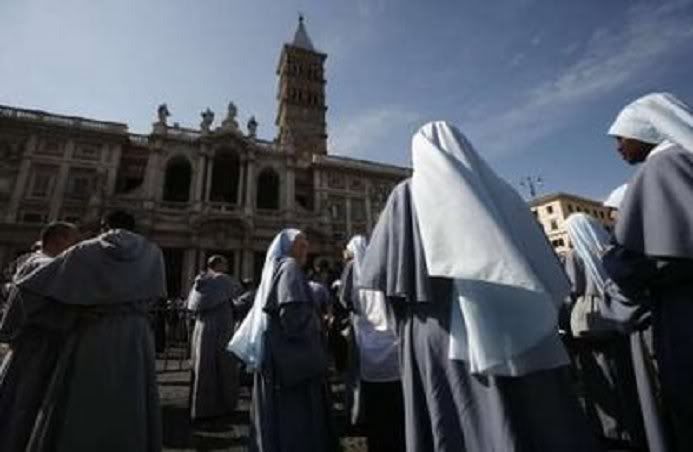
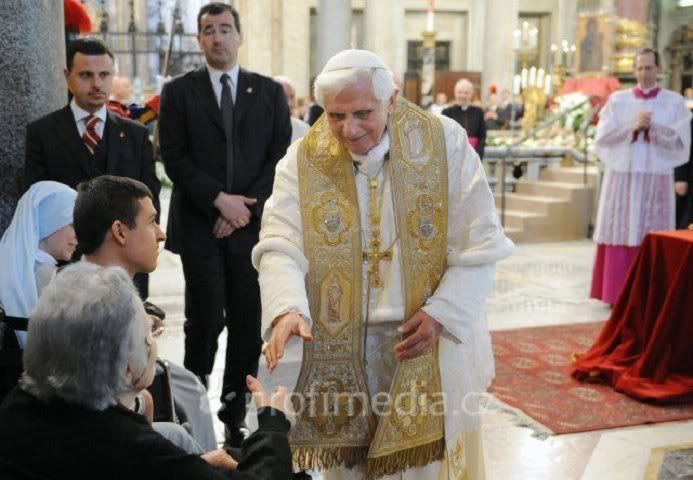
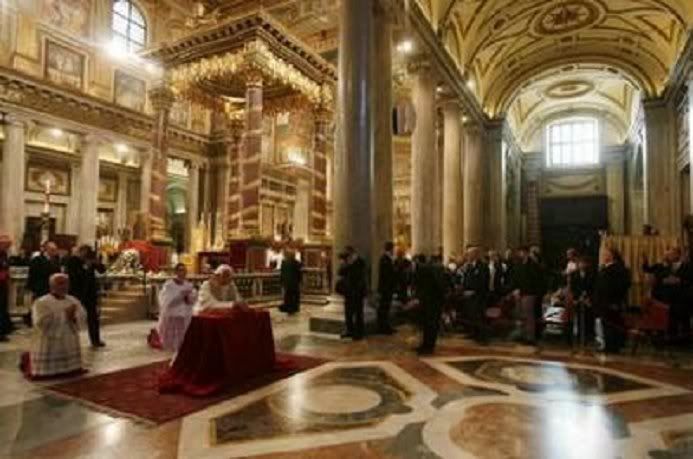
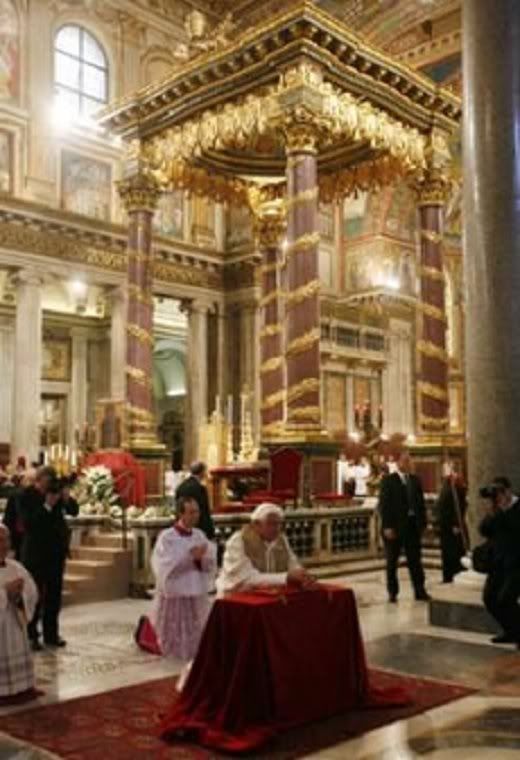
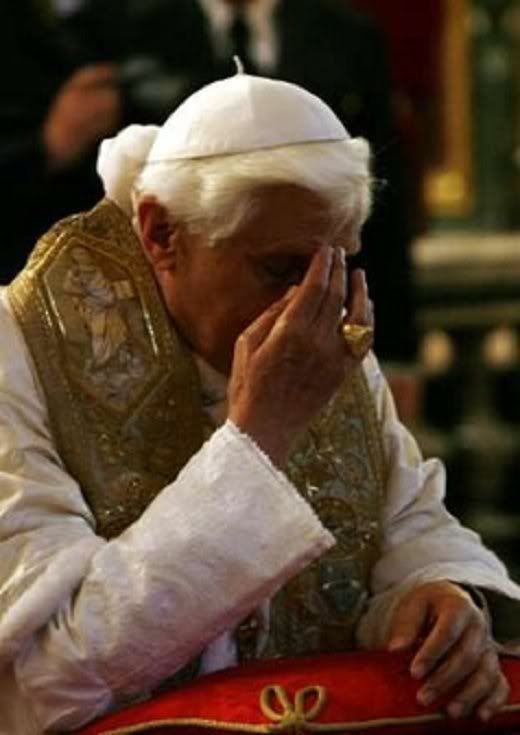
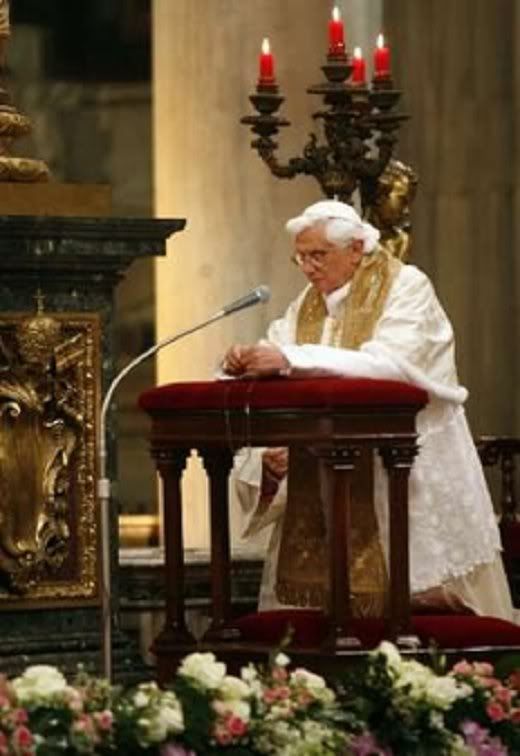
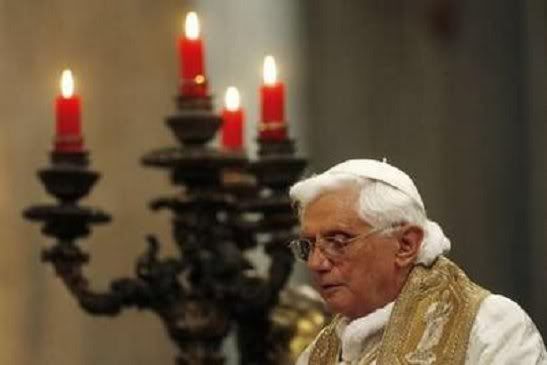 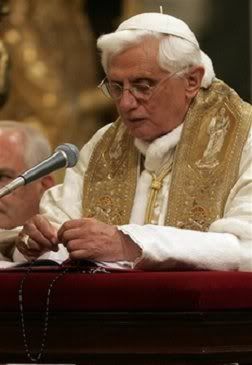
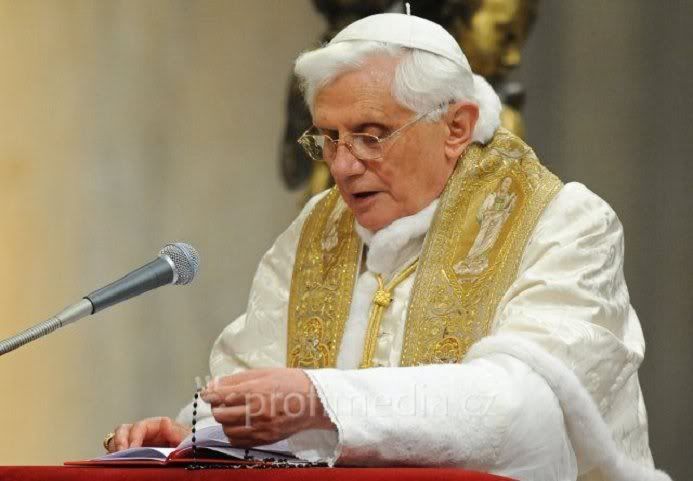
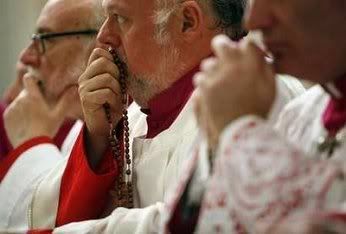 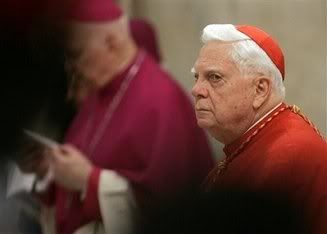 Right photo, Cardinal Bernard Law, archpriest of Santa Maria Maggiore
Right photo, Cardinal Bernard Law, archpriest of Santa Maria Maggiore.
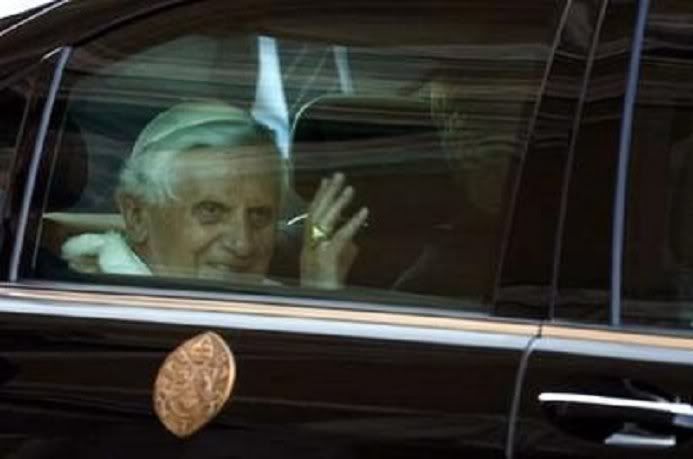 'The Rosary is not a practice
'The Rosary is not a practice
relegated to the past'
Translated from the
Italian service of

"The Holy Rosary is not a practice relegated to be past" but a prayer that "brings peace and reconciliation".
In synthesis, this was Benedict XVI's affirmation at the end of a recital of the Rosary at which he presided, in the Basilica of Santa Maria Maggiore this afternoon.
Thousands of faithful came to the Papal Basilica on this first Saturday of May, a month traditionally dedicated to the Mother of God.
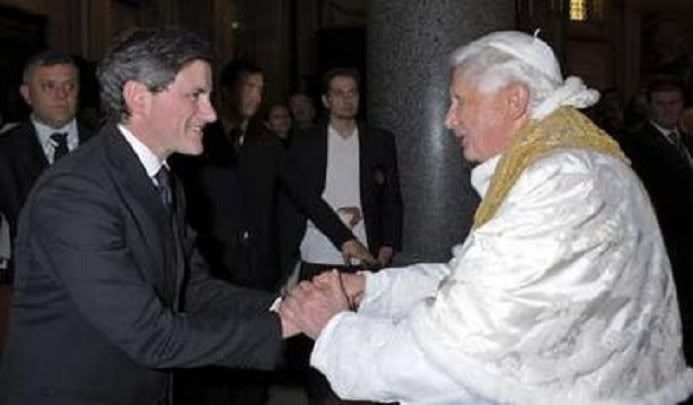
Among those present was the Mayor-elect of Rome, Gianni Alemanno, whom the Pope wished "a fruitful service for the good of the entire community."
Isabella Piro reports further:
The icon of Mary as Salus Popoli Romani (Salvation of the People of Rome) greeted His Holiness at his arrival in Santa Maria Maggiore today.
The Holy Father venerated the icon in silence for several minutes before starting the recitation of the Rosary - today commemorating the Joyful Mysteries in the life of Jesus, from the Annunciation to the finding of the 12-year-old Jesus among the wise men of the Temple.
These episodes caused the 81-year-old Pope to remember his own childhood:
In the experience of my generation, May brings back sweet memories linked to evening appointments to pay homage to Our Lady. How can one forget praying the rosary in the parish church, in courtyards and in all the neighborhoods of one's hometown?
He then spoke of the continuing power of the Rosary and on the dimension of prayer as a bearer of peace:
Today we confirm together that the Holy Rosary is not a practice relegated to the past, as a prayer of past times one remembers with nostalgia. Instead, it is going through what one might call a new spring. This is doubtless one of the more eloquent signs of the love that new generations feel towards Jesus and for his mother Mary.
In today's world which is so dispersive, this prayer helps to bring Christ to the center, as the Virgin did, whom meditated in her heart on all that was said about her Son and on all that He said and did.
With Mary, the heart is oriented to the mystery of Jesus. May the Blessed Virgin help us to welcome within us the grace which emanates from the mysteries of the Rosary sio that through us, society may be 'irrigated', starting with daily relationships, and be purified of so many negative forces and open it up to the news of God.
The Rosary, when it is prayed in an authentic way - not mechanically and superficially but profoundly - bring peace and reconciliation. It contains the healing power of the Most Holy Name of Jesus, invoked with faith and with love at the center of each Hail Mary.
The Pope called on all the faithful to feel 'close together and united in prayer' during this month of Mary in order to form, with her help, 'one heart and one soul'. Finally:
I entrust to you the most urgent intentions of my ministry, the needs of the Church, the great problems of mankind - peace in the world, Christian unity, dialog among all cultures.
For Rome and Italy, I invite you to pray for the pastoral objectives of the Diocese and for the fraternal development of this beloved country.
Cardinal Bernard Law, Arch-Priest of the Basilica, greeted the Holy Father with these words:
Today we join your prayers for the holiness and unity of teh Church, for peace in the world, built on the recognition of the dignity of every human being, which comes from God; for the sick and the weak, and for all those who are vulnerable.
With hearts full of gratitude, we pray for you, Holy Father, and for your mission to confirm us in the the faith, to remind us of the reason for our hope, and for urging us to live in the love of Christ.
[Modificato da TERESA BENEDETTA 05/05/2008 21:50] |
 04/05/2008 06:58 04/05/2008 06:58 |
|
| | | OFFLINE | Post: 395 | Registrato il: 24/11/2005
| Utente Senior | |
|
Is Liberal Catholicism Dead? By DAVID VAN BIEMA

Saturday, May 03, 2008
 Pope Benedict XVI attends a concert to mark the third anniversary of his pontificate.
Pope Benedict XVI attends a concert to mark the third anniversary of his pontificate.
He may not have been thinking about it at the time, but Pope Benedict, in the course of his recent U.S. visit may have dealt a knockout blow to the liberal American Catholicism that has challenged Rome since the early 1960s. He did so by speaking frankly and forcefully of his "deep shame" during his meeting with victims of the Church's sex-abuse scandal. By demonstrating that he "gets" this most visceral of issues, the pontiff may have successfully mollified a good many alienated believers — and in the process, neutralized the last great rallying point for what was once a feisty and optimistic style of progressivism.
The liberal rebellion in American Catholicism has dogged Benedict and his predecessors since the Second Vatican Council of 1962-65. "Vatican II," which overhauled much of Catholic teaching and ritual, had a revolutionary impact on the Church as a whole. It enabled people to hear the Mass in their own languages; embraced the principle of religious freedom; rejected anti-semitism; and permitted Catholic scholars to grapple with modernity.
But Vatican II meant even more to a generation of devout but restless young people in the U.S. rather than a course correction, Terrence Tilley, now head of the Fordham University's theology department, wrote recently, his generation perceived "an interruption of history, a divine typhoon that left only the keel and structure of the church unchanged." They discerned in the Council a call to greater church democracy, and an assertion of individual conscience that could stand up to the authority of even the Pope. So, they battled the Vatican's birth-control ban, its rejection of female priests and insistence on celibacy, and its authoritarianism.
Rome pushed back, and the ensuing struggle defined a movement, whose icons included peace activist Fr. Daniel Berrigan, feminist Sister Joan Chittister, and sociologist/author Fr. Andrew Greeley. Its perspectives were covered in The National Catholic Reporter, Commonweal and America. Martin Sheen held down Hollywood, and the movement even boasted its own cheesy singing act: the St. Louis Jesuits. The reformers' premier membership organization was Call to Action, but their influence was felt at the highest reaches of the American Church, as sympathetic American bishops passed left-leaning statements on nuclear weapons and economic justice. Remarks Tilley, "For a couple of generations, progressivism was an [important] way to be Catholic."
Then he adds, "But I think the end of an era is here."
To some extent, liberal Catholicism has been a victim of its own success. Its positions on sex and gender issues have become commonplace in the American Church, diminishing the distinctiveness of the progressives. More importantly, they failed to transform the main body of the Church: John Paul II, a charismatic conservative, enjoyed the third-longest papacy in church history, and refused to budge on the left's demands; instead, he eventually swept away liberal bishops[ Really??]. The heads at Call to Action grayed, and by the late 1990s, Vatican II progressivism began to look like a self-limited Boomer moment.
Then, the movement received a monstrous reprieve. The priest sex abuse scandal implicated not only the predators, but the superiors who shielded them. John Paul remained mostly silent. A new reform group, Voice of the Faithful, arose; the old anger returned, crystallizing around the battle-cry "They just don't get it."
Benedict's visit, however, changed the dynamic. And that's a problem for progressives. Says Fr. Thomas Reese, a senior fellow at Georgetown University's Woodstock Theological Center whom Benedict famously removed from his previous job as editor of America, "Reform movements need an enemy to organize against. As most bishops have gotten their acts together on sex abuse, they have looked less like the enemy and more like part of the solution. Enthusiasm for reform declined. With the Pope's forthright response, it will decline even more."
Not everyone agrees. Says Voice of the Faithful spokesman John Moynihan, "That's funny; I just came from a meeting of COR (Catholic Organizations for Reform), and there were a lot of people very buoyed up. We can now say to people, 'We have made a difference, and if you stick with us we are going to make a further difference'." Adds Peter Steinfels, a former editor of Commonweal, now a director of Fordham's Religion and Culture Center, "I think there is continuity in terms of the issues and the questions about whether Church structures can be altered." He notes that a social justice group, Catholics in Alliance for the Common Good, formed just three years ago.
But the familiar progressives-versus-Vatican paradigm seems almost certain to be undone by a looming demographic tsunami. Almost everyone agrees that the "millennial generation," born in 1980 or later, while sharing liberal views on many issues, has no desire to mount the barricades. Notes Reese, "Younger Catholics don't argue with the bishops; they simply do what they want or shop for another church." And Hispanic Catholics, who may be the U.S. majority by 2020, don't see this as their battle. "I'm sure they're happy that the celebration of the Eucharist is in the vernacular," says Tilley, "but they don't have significant issues connected to Vatican II."
And so, unless Benedict contradicts in Rome what he said in New York, the Church may have reached a tipping point. This is not to say that the (over-hyped) young Catholic Right will swing into lay dominance. Nor will liberal single-issue groups simply evaporate. But if they cohere again, it will be around different defining issues. "It's a new ball game," admits Steinfels. As Tilley wrote recently in Commonweal regarding his fellow theologians, "A new generation has neither the baggage nor the ballast of mine. Theirs is the future. Let's hope they remember the Council as the most important event in twentieth-century Catholicism."
Let's see.
SOURCE: www.time.com/time/nation/article/0,8599,1737323,00.html?xid=site-cnn...
======================================================================
'Is liberal Catholicism dead?' Dem 'r fighting words! Somehow I think Van Biema's real motive for this item is to prod US liberal Catholics into renewed action. Does anyone really see the combative, belligerent liberals of National Catholic Reporter, Commonweal, America, Voice of the Faithful, etc. just fading out and slinking silently into their kennels???? Hah! Not while there's breath left in them.
I don't think their cosmic-size egos will allow them to do that. They really believe that their reverse crusading will eventually badger and coerce the 'one, holy, Catholic and Apostolic Church' into taking up their pet causes, i.e., that they will manage to overturn more than 2000 years of faithfully kept doctrine and tradition, and turn the entire Church Magisterium into an a la carte menu from which anyone can pick and choose what suits them.
Their overweening self-righteousness and conviction that they can, on their own, change the Church into their own image and likeness, is the only reason they don't break off and form their own church, which logically they should, if they so object to many of the fundamental teachings of the Catholic Church.
Well, they obviously won't change the Church with this Pope or any other Pope who lives up to his ministry. But does anyone doubt that they will go on yipping and yapping, barking and growling, drooling and dripping unmuzzled venom, perhaps even more ferociously than ever? We have by no means heard the last of them.
Steinfels is quoted as saying, "Let's hope they (the new generations) remember the Council as the most important event in twentieth-century Catholicism."
Yes, but they should remember it as a continuity with all that went before, a step forward of self-renewal by the Church without casting off the preceding 2000 years. And that is what Benedict XVI has been saying all along.
Vatican-II was about pastoral action in the contemporary world, not about creating new dogma - but the liberals cannot and do not accept that, because they have so deluded themselves with their false concept of the 'spirit of Vatican-II'. What about looking at the Vatican-II documents and really reading them - in entirety, and not selectively - for a change?
TERESA
[Modificato da TERESA BENEDETTA 04/05/2008 17:37] |
 04/05/2008 16:50 04/05/2008 16:50 |
|
| | | OFFLINE | | Post: 13.288 | Registrato il: 28/08/2005
| Utente Gold | |
|
PAPA IN THE PIAZZA TODAY
A full translation of both the Pope's Regina Caeli message today and his address to Italian Catholic Action has been posted in AUDIENCE AND ANGELUS TEXTS and HOMILIES, DISCOURSES, MESSAGES, respectively.
CHRISTIAN HOPE - A SURE AND STEADFAST ANCHOR
VATICAN CITY, 4 MAY 2008 (VIS) - On today's Solemnity of the Ascension, Benedict XVI prayed the Regina Coeli from the atrium of the Vatican Basilica with thousands of faithful from Italian Catholic Action and other pilgrims who filled St. Peter's Square.
The Pope recalled how following the Ascension "the first disciples remained together in the Cenacle around the Mother of Jesus, fervently awaiting the gift of the Holy Spirit which Jesus had promised".
"In His farewell discourses to His disciples, Jesus had given great emphasis to the importance of His 'return to the Father', as the coronation of His mission. He, in fact, came into the world to bring man back to God, not theoretically - like a philosopher or a sage - but in a real sense, as a shepherd leading his sheep to the fold. And it was entirely for us that Jesus experienced in His own person this 'exodus' towards the heavenly homeland".
"It is for this reason that the Father was pleased with Him and 'highly exalted' Him, restoring Him to the fullness of His glory, but now with our humanity. God in man - man in God: this is now a real not a theoretical truth. Hence Christian hope, founded in Christ, is not an illusion but, as the Letter to the Hebrews says, 'a sure and steadfast anchor of the soul'".
"And what", the Pope asked, "does man in all times need if not this: a solid anchor for his existence? Here again, then, is the stupendous sense of Mary's presence among us. Turning our gaze to her, as the first disciples did, we are immediately transported to the reality of Jesus. The Mother leads back to the Son, Who is no longer among us physically but awaits us in the house of the Father. Jesus invites us not to remain gazing upwards, but to stay together, united in prayer, invoking the gift of the Holy Spirit".
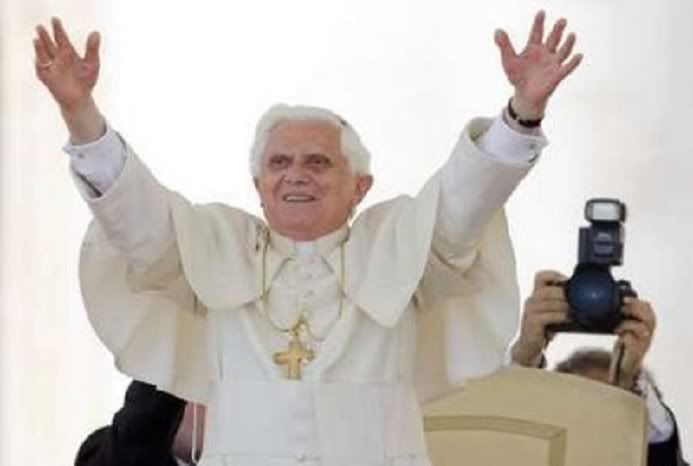
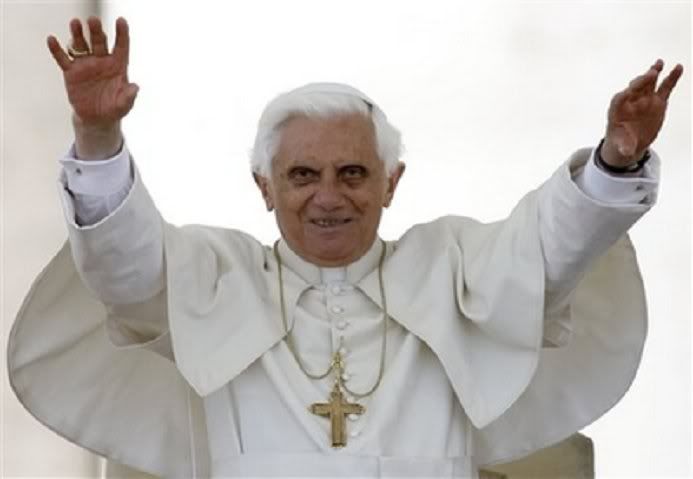
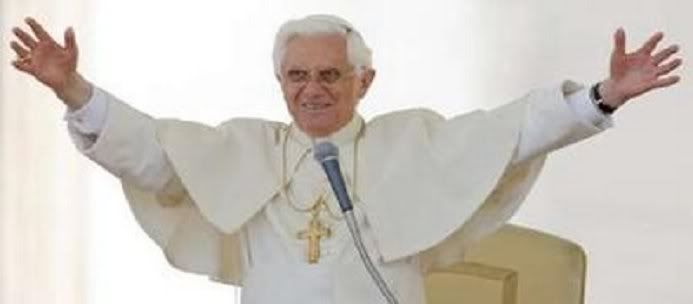
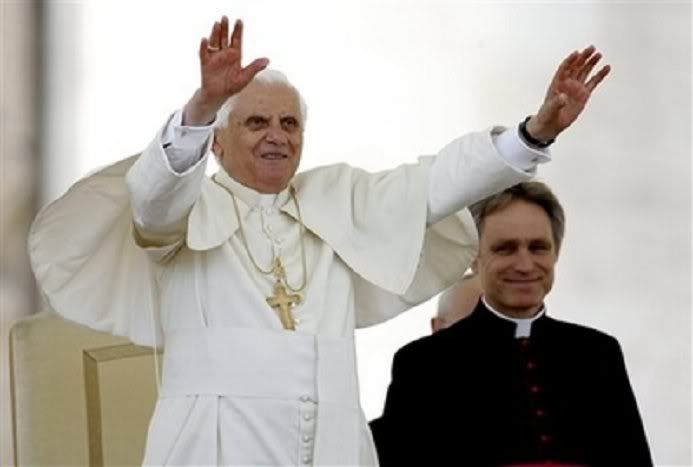 POPE GREETS 'CATHOLIC ACTION' OF ITALY
POPE GREETS 'CATHOLIC ACTION' OF ITALY
AT OPEN-AIR 'CENACLE' -
100,000 AT ST. PETER'S TODAY
Vatican City, May 4 (AsiaNews) - "Saint Peter's Square presents itself today almost as an open-air 'cenacle', crowded with faithful, many of them members of Italian Catholic Action - this is how Benedict XVI greeted some 100,000 members of the most widespread ecclesial association in Italy, in his reflection before the Regina Caeli today.
The young and adults of Catholic Action (AC) were gathered in the square to celebrate the 140th anniversary of their foundation with a Mass earlier, presided by Cardinal Angelo Bagnasco, president of the Italian bishops' conference.
The Pope came to the front steps of St. Peter's Basilica at noon to lead the Regina Caeli prayer, which was preceded by his usual Sunday mini-homily,
But after the prayer, he also addressed the assembly specifically.
Before the Regina Caeli, the pontiff emphasised the value of today's feast, the Ascension of Christ to heaven and his "return to the Father" with his and our humanity.
"He", the pope explains, "in fact came to the world to bring men back to God, not on the level of ideas - like a philosopher or master of wisdom - but really, as a shepherd who wants to lead his sheep back to the fold . . . It is for us that he came down from Heaven, and it is for us that he ascended there after making himself like men in all things, humiliated to the point of death on the cross, and after touching the abyss of the greatest separation from God".
"God in man - man in God" are "not a theoretical truth, but a real one", an anchor for the life of all men. "And what does man need more in every age if not this: a solid anchoring for his existence?".
"After the Ascension", the Pope further recalled, "the first disciples remained gathered together in the Cenacle around the Mother of Jesus, in fervent expectation of the gift of the Holy Spirit, promised by Jesus (cf. Acts 1:14)".
From this arises the invitation "to remain united together in prayer, to invoke the gift of the Holy Spirit. In fact, only to those who 'are born again from above', meaning from the Holy Spirit, is opened the entrance to the Kingdom of heaven (cf. Jn. 3:3-5), and the first one 'born again from above' is precisely the Virgin Mary".
After the Marian prayer, the Pope addressed a greeting in various languages to the faithful present. Among others, he greeted a group of the Neocatechumenal Way from Mumbai.
To the members of the AC afterwards, the Pope recalled the ample "ecclesial dimension" of the association, not a "sign of an uncertain or outdated identity", but "rather a great responsibility of our lay vocation".
He then urged all to carry out the Christian mission in society: "In a missionary Church, placed before an educational emergency like the one found in Italy today, you who love and serve it should be tireless announcers and prepared, generous educators; in a Church called to trials of faithfulness that are sometimes very demanding, and tempted to adaptation, you must be courageous and prophetic witnesses of the radical nature of the Gospel; in a Church that faces the relativistic, hedonistic, and consumerist mentality on a daily basis, you must be able to make more room for rationality under the banner of a faith that is the friend of intelligence, both in the area of popular mass culture, and in that of more elaborate and reflective research; in a Church that calls to the heroism of sanctity, respond without fear, always trusting in the mercy of God".
The Pope went among the crowd in the Popemobile afterwards.
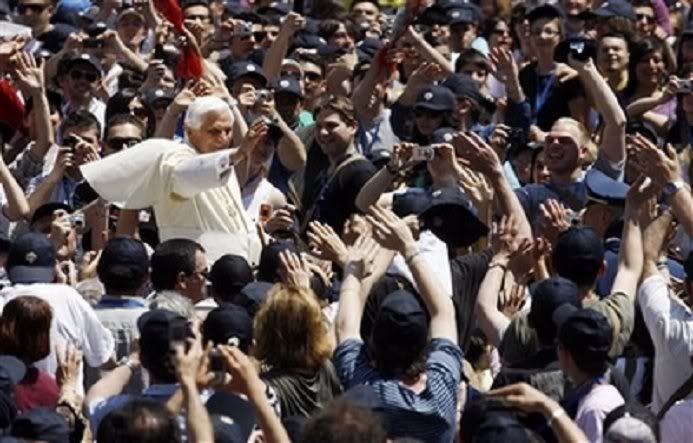

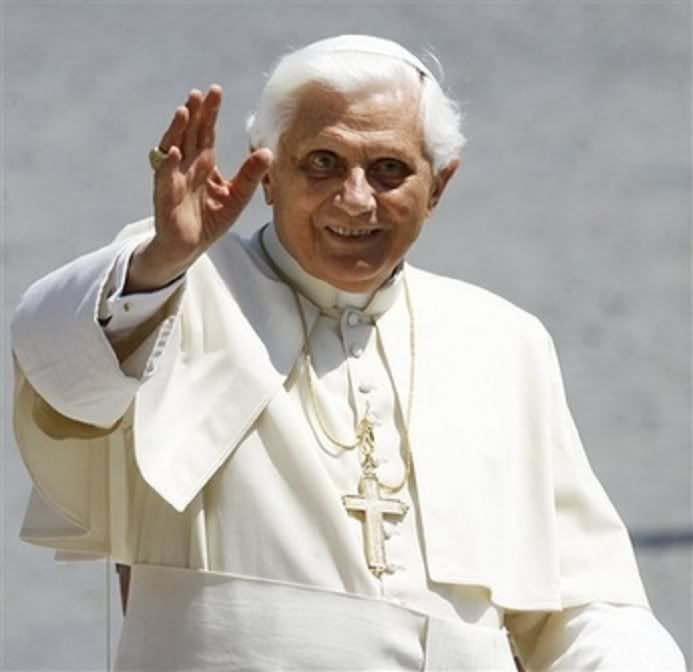
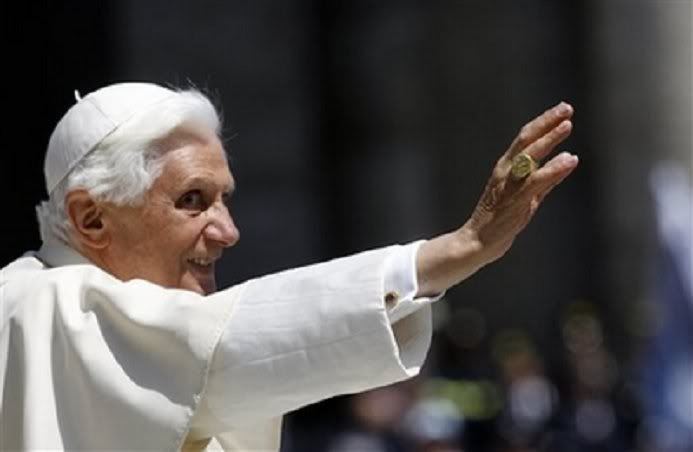
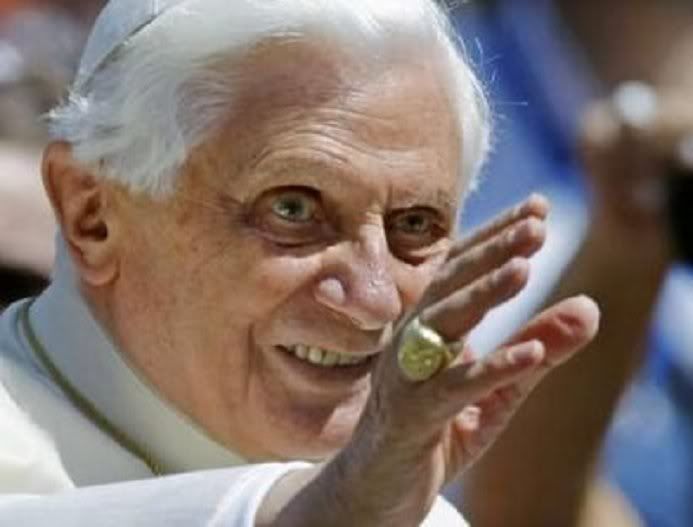
======================================================================
The Holy Father has never looked so well, I am tempted to say. Since his return from the United States, it's almost as if Providence is asking his detractors, 'Is this a man in poor health or what?'
May God continue to watch over our beloved Papino and help him carry out his ministry for Christ ad majorem Dei gloriam. He has the love and prayers of his whole flock. Ad multos annos, Benedicte!
[Modificato da TERESA BENEDETTA 05/05/2008 21:33] |
 04/05/2008 18:09 04/05/2008 18:09 |
|
| | | OFFLINE | | Post: 13.291 | Registrato il: 28/08/2005
| Utente Gold | |
|
  Pope to decide on
Pope to decide on
visiting Northern Ireland

May 4, 2008
A decision is expected later this year on whether Pope Benedict will accept an invitation to visit Northern Ireland.
The invitation was issued by Irish Catholic bishops last year.
The Pope's spokesman, Father Federico Lombardi, told Sunday Sequence the Holy Father's international agenda for 2009 would be known before the year's end.
If it goes ahead, it would be the first papal visit to Ireland since Pope John Paul II in 1979. He was unable to travel to NI for security reasons.
Father Lombardi said: "The agenda of the Pope for the next year is not decided.
"He has received many invitations, he takes all invitations with the greatest attention and also with great desire to answer yes. But he knows also very well that the time is limited, and the possibilities of human beings are limited, and he has to make choices.
"I don't know now which will be the choices for the next year.
"I hope that... before the end of the year we will have an idea of the agenda of the international journeys of the Pope."
Last October, a leading clergyman said Pope Benedict XVI may visit Northern Ireland.
Archbishop Diarmuid Martin said he interpreted the choice of Sean Brady as cardinal as an indication the Pontiff wanted to visit Northern Ireland.
He said such a visit would have "the symbolic meaning of ending an era of our history and opening to something new, north and south".
Back in 1979, Catholics from all over Ireland flocked to see Pope John Paul II.
He was the first Pope to visit Ireland and was greeted by vast crowds during a hectic schedule which included Dublin, Drogheda, Galway, Limerick and Knock.
The most enduring memory of that papal visit was his impassioned plea for peace in Northern Ireland.
Pope set to meet
Archbishop of Canterbury
VATICAN CITY, May 4 (Reuters) - Pope Benedict is expected to meet the Archbishop of Canterbury Rowan Williams on Monday in only the second official meeting between the two religious leaders, a Vatican source said on Sunday.
The meeting comes less than two months after the Vatican's top officials for relations with Islam criticised Williams as mistaken and naive for suggesting that some aspects of Sharia law in Britain were unavoidable.
The spiritual leader for the world's 77 million Anglicans, Williams -- who sparked a political storm with the Sharia comments -- last held talks with the Pope in November 2006.
Ties between the two churches have been strained over the past decade over the issue of women priests and homosexual bishops in the Anglican Church, which both leaders have acknowledged as obstacles to unity.
[Modificato da TERESA BENEDETTA 04/05/2008 20:31] |
 04/05/2008 22:20 04/05/2008 22:20 |
|
| | | OFFLINE | | Post: 13.296 | Registrato il: 28/08/2005
| Utente Gold | |
|
|
 05/05/2008 13:15 05/05/2008 13:15 |
|
| | | OFFLINE | | Post: 13.306 | Registrato il: 28/08/2005
| Utente Gold | |
|
 Chinese orchestra's Vatican concert:
Chinese orchestra's Vatican concert:
Does it suggest an improvement in relations?
By ANITA CHANG
BEIJING, May 5 (AP) - The China Philharmonic Orchestra plans to perform this week for Pope Benedict XVI, state media reported Monday, the latest indication that the often-strained ties between Beijing and the Vatican are improving.
The performance at the Vatican on Wednesday, featuring Mozart's "Requiem," was initiated by the Chinese and arranged rather quickly, conductor Yu Long told the state-run China Daily.
The concert was listed on the Vatican's public schedule.
"I certainly feel very excited. It is a historic visit. Although we played in Rome in 2004, this will be the orchestra's first appearance at the Vatican," Yu was quoted as saying.
China's officially atheist Communist Party forced Chinese Catholics to cut ties with the Vatican in 1951, and the two sides have not restored formal ties. Beijing sees the Vatican tradition of the Pope naming his own bishops as interference in the country. China appoints bishops for its state-sanctioned Catholic church.
While China's most onerous restrictions on religious activity have been lifted, many of the country's estimated 12 million Catholics worship in congregations outside the state-approved Church.
Benedict has made the improvement of relations with Beijing a priority of his papacy. He sent a special letter to Catholics in China last year, praising the underground church, but also urging the faithful to reconcile with followers of the official church.
Though China and the Vatican have no formal diplomatic ties, Chinese priests and seminarians routinely go to the Vatican for training.
Wang Jinfu, deputy director of the orchestra's business department, said in a telephone interview from the Vatican the concert was non-governmental and would "link Chinese culture and the whole world."
The Chinese Foreign Ministry said it hoped the concert will be a "big success."
"Music is a universal language that can bring together people from different countries, and from different religious and cultural backgrounds," China Daily quoted an unidentified ministry official as saying.
The ministry did not immediately respond Monday to a faxed request for comment from The Associated Press.
The Beijing-based orchestra arrived in Rome on Sunday for a tour of three European cities, the newspaper reported. Its first show is at the Vatican's Paul VI Audience Hall, accompanied by the Shanghai Opera House Chorus.
China approached Vatican
about concert for Pope
By Philip Pullella
VATICAN CITY, May 5 (Reuters) - Beijing approached the Vatican to let the China Philharmonic Orchestra perform for Pope Benedict in an unprecedented concert that could help improve often thorny relations, Church sources said on Monday.
The sources, who spoke on condition that they not be named, said the Vatican realized that China is trying to improve its international image but that Church officials hope the performance could be a seed for eventual diplomatic relations.
However they cautioned not to expect any immediate breakthroughs following Wednesday night's concert at the Vatican.
"I don't think they (the communist government) are doing it out of love for the Pope or love of the Holy See but it will be positive in the end," said one source, a priest who is familiar with the situation.
The orchestra, currently on a European tour, will perform Mozart's "Requiem" and Chinese folk songs along with the Shanghai Opera House Chorus in the Vatican audience hall.
Benedict has made improving relations with Beijing a major goal of his pontificate and issued a 55-page open letter in June saying he sought to restore full diplomatic ties with China that were severed two years after the 1949 Communist takeover.
Catholics in China are split between those who belong to a state-backed Church and an underground Church whose members are loyal to the Vatican.
The priest said a Chinese diplomatic envoy approached a Vatican official outside Italy and made the offer. An initial offer for the orchestra to play for the Pope was made several months ago but the concert could not be arranged.
"It's very important that they made the offer again," the priest said. "It will be positive for the Chinese people to see the pope too," adding that he expected the concert to be broadcast on Chinese television.
Another source said the Chinese were clearly "shopping for good will" in an effort to improve China's international image, tarnished by recent unrest in Tibet and disruptions of the international leg of the Olympic torch relay.
"Each side clearly has its own interest in this," the second source said, calling the Vatican's willingness to host the concert "a good will gesture".
Relations between the Vatican and Beijing have hit low points several times in recent years as the Vatican criticized China for appointing bishops without papal approval.
Benedict accused China of "grave violations of religious freedom" in 2006. Relations warmed significantly last September when the Vatican approved the installation of a new state-approved Catholic bishop of Beijing.
China wants the Vatican to sever diplomatic relations with Taiwan, which it considers and renegade province.
In Beijing, conductor Yu Long saw parallels between the performance and the New York Philharmonic's ice-breaking concert in Pyongyang, North Korea in February.
In both cases, orchestras were being used to set the mood music for diplomatic warming.
"You can make that comparison. If music as a universal language can make a contribution to diplomacy or world peace, I will be very happy," Yu told Reuters in an interview.
(Additional reporting by Guo Shipeng and Benjamin Kang Lim) (Reporting by Philip Pullella; Editing by Samia Nakhoul)
Here's how China's official news agency Xinhua reports it:
Chinese orchestra to perform for Pope

Beijing, May 5 (Xinhua) - The China Philharmonic Orchestra (CPO) will perform Wednesday for Pope Benedict XVI at the Paul VI Audience Hall in the Vatican City, the China Daily reported Monday.
The Beijing-based CPO, founded in 2000, arrived in Rome Sunday, on a performing tour of three European cities, the first leg of which is the Vatican.
Yu Long, the artistic director, will conduct the orchestra with Mozart's Requiem as the start, and the well-known Chinese folk song Jasmine Flower as the grand finale, the newspaper added.
The Shanghai Opera House chorus will accompany the orchestra.
'It is a people-to-people exchange event through culture and art,' a Chinese government official said.
'Music is a universal language that can bring together people from different countries, and from different religious and cultural backgrounds. We hope the concert will be a big success,' he said.
The Vatican Radio said: 'Music confirms its role as a language and the most precious medium for dialogue among peoples and cultures.'
Shanghai-born and German-trained conductor Yu, 44, likened the orchestra's visit to 'ping pong diplomacy', referring to the visit by the American table tennis players to China in 1971, which opened the door to China-US exchanges.
The Philharmonic has performed Mozart's Requiem at St Joseph's Church (Dongtang Cathedral) in Beijing two years ago.
On April 8, the orchestra and Shanghai Opera House chorus presented the same concert at St Ignatius Cathedral in Shanghai to an audience of more than 1,000, to mark the church's 400th anniversary.
'That opened up this kind of territory,' Yu said, adding that such a concert provides a common vehicle for promoting dialogue and peace.
[Modificato da TERESA BENEDETTA 06/05/2008 01:08] |
 05/05/2008 14:07 05/05/2008 14:07 |
|
| | | OFFLINE | | Post: 13.308 | Registrato il: 28/08/2005
| Utente Gold | |
|
 Iranian mullahs spin visit with Pope:
Iranian mullahs spin visit with Pope:
The heart has its own unreason
By Spengler
 
May 6, 2008
"A madman is not someone who has lost his reason. A madman is someone who has lost everything but his reason," wrote English writer G K Chesterton, adding, "Poets do not go mad, but chess players do."
The Persians invented chess, but have been prone to madness since Xerxes flagellated the sea for obstructing his failed attempt to invade Greece in the 5th century BC. Today's Persians evince grandmasterly cunning in their maneuvers against America, but are madder than Xerxes.
Iran's President Mahmud Ahmadinejad thinks that the Holocaust never happened, that there are no homosexuals in Iran, and that the American cartoon Tom and Jerry is an instrument of Zionist propaganda.
Persia's leaders evince a sort of thinking that in other countries
would constitute legal grounds for commitment to a psychiatric hospital.
On January 5, 2005, Ahmadinejad said, "We must believe in the fact that Islam is not confined to geographical borders, ethnic groups and nations. It's a universal ideology that leads the world to justice. We don't shy away from declaring that Islam is ready to rule the world. We must prepare ourselves to rule the world."
How, then, should one make sense of the joint statement signed April 30 between the Vatican and a group of visiting Iranian clerics, attesting to the benefits of reason?
According the May 1 L'Osservatore Romano, Pope Benedict XVI and the Iranians agreed that "Faith and reason do not contradict each other; although faith can in some cases be above reason, it never can be against it", and that "Faith and reason are intrinsically nonviolent".
In his September 2006 address in Regensburg, Pope Benedict XVI challenged elements of manifest irrationality in Muslim theology, for example, the view of some Islamic theologians that "God is not bound even by his own word, and that nothing would oblige him to reveal the truth to us. Were it God's will, we would even have to practice - idolatry." Outrage erupted against the pope throughout the Islamic world.
On the Easter Vigil last March, Benedict XVI baptized Muslim journalist Magdi Allam into the Catholic faith, who declared, "Beyond the contingency of the phenomenon of Islamic extremism and terrorism that has appeared on a global level, the root of evil is inherent in an Islam that is physiologically violent and historically conflictive [see The mustard seed in global strategy Asia Times Online, March 26, 2008]".
Muslim consternation knew no bounds, although a Vatican spokesman averred that Allam was speaking for himself.
Now, in one of the weirder acts of recent diplomacy, a delegation of robed and turbaned Iranian mullahs has come to Rome to declare with due solemnity that they share the Pope's view that reason and faith are compatible.
The meeting was the sixth in a long-scheduled series of discussion between Iranian clergy and the Holy See, to be sure, but unlike any of the previous encounters.
Iran's news agency hailed it as a great propaganda victory for the Islamic Republic, writing on May 2 in fractured English:
Spiritual head of the Roman Catholic Church, Pope Benedict XVI in a meeting with Iran's delegation to Vatican called for utmost cultural and religious cooperation between the two sides. He regarding faith and reason discussed in the recent dialogues between Islam and Roman Catholic Church said, "Faith and reason are the two things that the world needs them today more than any other time and this is our duty to provide this need for the society."
He also appreciated Iranian delegation for its present "Holy Koran", calling it a precious book.
Head of Iran's Islamic culture and relations organization Mahdi Mostafavi responded Iran is ready to expand cultural and religious cooperation with Vatican. [sic] [/QUOTE}Tactical aims condition some part of Tehran's sudden regard for the sanctity of reason.
As the Catholic News Service reported on April 29, Iran's government is searching for allies against American-led efforts to isolate it:
L'Osservatore Romano has cited the words of Iran's President Mahmud Ahmadinejad, praising the Holy See for its diplomatic efforts.
During an April 6 meeting with the new papal nuncio in Iran, Archbishop Jean-Paul Gobel, Ahmadinejad said that the Vatican has been a positive force for justice, peace, and the protection of human rights around the world, L'Osservatore reported.
Iran has been maneuvering to secure the support of the Holy See to counteract hostile pressure from the US and European nations.
Nonetheless, the issue transcends the near-term exigencies of Iranian diplomacy. It is a double-edged sword, for Islamic scholars can argue day and night that they are just as reasonable as Christians or Jews. The trouble with arguing reason to a lunatic, as Chesterton suggested, is that lunatics more than anyone else are sure of their own reasonableness.
What American author George Weigel calls the Pope's "new public grammar" for the "reform of Islam" has an apparent disadvantage, namely that no one depends more on reason than the calculating paranoids of Persia.
It is not deception, but the expression of injured innocence, for the Iranian mullahs to sign a document attesting to the interdependency of faith and reason.
Last year I criticized the Pope, perhaps unfairly, for placing too great a burden on reason in the encounter with Islam.
The full statement reads (in my translation from the Italian):
1. Faith and reason are both God's gifts to humanity.
2. Faith and reason do not contradict each other; although faith can in some cases be above reason, it never can be against it.
3. Faith and reason are intrinsically nonviolent. Neither reason nor faith should be used for violence; nonetheless, at times, both have been ill-used to perpetrate violence. In any case, these events cannot place reason or faith in doubt.
4. Both of the parties agree to cooperate in furthering authentic religiosity, and in particular spirituality, to promote respect for sacred symbols and moral values.
5. Christians and Muslims should proceed from tolerance, recognizing differences, remaining aware of things they have in common, and giving thanks for these to God. They are called to reciprocal respect, that is, to condemning derision of religious creeds.
6. Generalizations should be avoided when speaking of religion. The differences between the confessions within Christianity and Islam as well as the differences in historical context are both important factors to be taken into consideration.
7. Religious traditions cannot be judged on the basis of a single verse or passage in their respective sacred texts. A holistic vision and an adequate hermeneutic method are necessary for their correct comprehension.
The final point contains a submerged mine on which the Muslim side well might founder, for the application of reason to sacred texts presents an existential threat to Islam. As Pope Benedict has observed on many occasions, no Catholic scholar of note doubts that the Bible contains multiple authorship of key texts as well as later redaction.
In the Christian view, the Hebrew and Greek writings that comprise the Bible are the word of God, but through human witness, such that the occasional error or contradiction poses no threat to faith.
Not so the Koran, which purportedly was dictated word by word by the Archangel Gabriel to Mohammed. Western scholars who have discovered minor variants in ancient copies of the Koran take their lives in their hands when they publish such results (see Indiana Jones meets the Da Vinci code, Asia Times Online, January 15, 2008).
To include under the rubric of reason freedom for textual criticism threatens the existence of Islam. With all due respect for sacred texts, and without derision, scholars well might seek to demonstrate that the Koran was written in the 9th rather than the 7th century, and not at all by Mohammed, who might or might not have existed to begin with. My September 2006 critique of Benedict's Regensburg address did not consider this dimension.
Then Cardinal Ratzinger alluded to the inflexibility of Islam in his 1996 interview book The Salt of the Earth, and as Benedict XVI has returned to the vulnerability of the Koranic text on subsequent occasions, notoriously at a 2005 seminar with former students at his Castel Gandolfo summer residence (See When even the Pope has to whisper, Asia Times Online, January 10, 2006).
Just what Pope Benedict has in mind is a matter of controversy. The Catholic writer Weigel recently published a book entitled Faith, Reason and the War Against Jihadism, in which he speaks of an "an internal Islamic civil war" between violent jihadis on one hand, and the forces of Islamic reform on the other. The forces of reform, he claimed in an April 12 Newsweek essay, include King Abdullah of Saudi Arabia.
According to Weigel, "Benedict XVI has quietly put his pontificate behind the forces of Islamic reform - and may have found a crucial ally with a Saudi king who is wrestling with Wahhabi extremism in his own domain."
I see matters very differently, for jihad is the defining sacrament in Islam, the cognate of the Lord's Supper in Christianity.
If we believe Father Joseph Fessio's account of the Castel Gondolfo meeting during an American interview, this view of prospective Islamic reform was advocated to the Pope in 2005, but the Pope ruled it out on theological grounds. As Father Fessio reported,
And immediately the Holy Father, in his beautiful calm but clear way, said, well, there's a fundamental problem with that because, he said, in the Islamic tradition, God has given His word to Mohammed, but it's an eternal word. It's not Mohammed's word. It's there for eternity the way it is. There's no possibility of adapting it or interpreting it, whereas in Christianity, and Judaism, the dynamism's completely different, that God has worked through his creatures.
And so it is not just the word of God, it's the word of Isaiah, not just the word of God, but the word of Mark. He's used his human creatures, and inspired them to speak his word to the world, and therefore by establishing a church in which he gives authority to his followers to carry on the tradition and interpret it, there's an inner logic to the Christian Bible, which permits it and requires it to be adapted and applied to new situations.
An interviewer then asked Fessio, "And so the Pope is a pessimist about that changing, because it would require a radical reinterpretation of what the Koran is?" Fessio replied, "Yeah, which is it's impossible, because it's against the very nature of the Koran, as it's understood by Muslims."
Fessio's remarks caused something of a scandal, after which he apologized for "making too crude a distinction" between the Koran and the Bible, while insisting that he had "paraphrased the Holy Father with general accuracy".
At the end of the day, we have two different accounts of the views of Benedict XVI with respect to Islam, one (Weigel's) that sounds very much like the view of the George W Bush administration, and another (Fessio's) that is consonant with the direr pronouncements of Magdi Allam. Too much might be made of this opposition.
The Pope is more than the theologian Joseph Ratzinger, whose views on the petrified character of the Koran are a matter of record: he is the head of both the Catholic Church and the Vatican State, whose pastoral as well as diplomatic requirements impose the prudence of high office.
Ratzinger the theologian well knows that the absolutely transcendent god of Islam is a different entity than the revealed God whom Jews and Christians worship.
As Father Richard John Neuhaus wrote in a May 2 note on the First Things website, "The Christian understanding of God is not that of an omnipotent deity handing down commands from on high, but that of God's emptying himself of glory (kenosis) in order to become one with his human creatures, inviting and enabling us to be lifted up by participation in his eternal life. In other words, incarnation; in other words, 'the human face of God'."
I addressed this issue through the theology of Franz Rosenzweig in a recent article.
Ultimately, neither the diplomats nor the theologians will decide these issues. This is the prerogative of converts like Magdi Allam. History is not made by rational design but by the demands of the human heart, which has its own reason as well as unreason. Great institutions and sovereign states will address each other, except in wartime, with cautious respect; not so the individuals whose existential needs ultimately steer the fate of nations.
In this respect Benedict XVI is wise, not only with his own 80 years, but with the accumulated wisdom of the 80 generations since the founding of his Church.
Neither Ratzinger the theologian nor the Bishop of Rome has the final word; by receiving Magdi Allam into the church on the eve of Easter he entrusted the great questions to the hearts of the people who will carry it to their eventual conclusion.
[Modificato da TERESA BENEDETTA 05/05/2008 18:18]
|
|
|
|
|